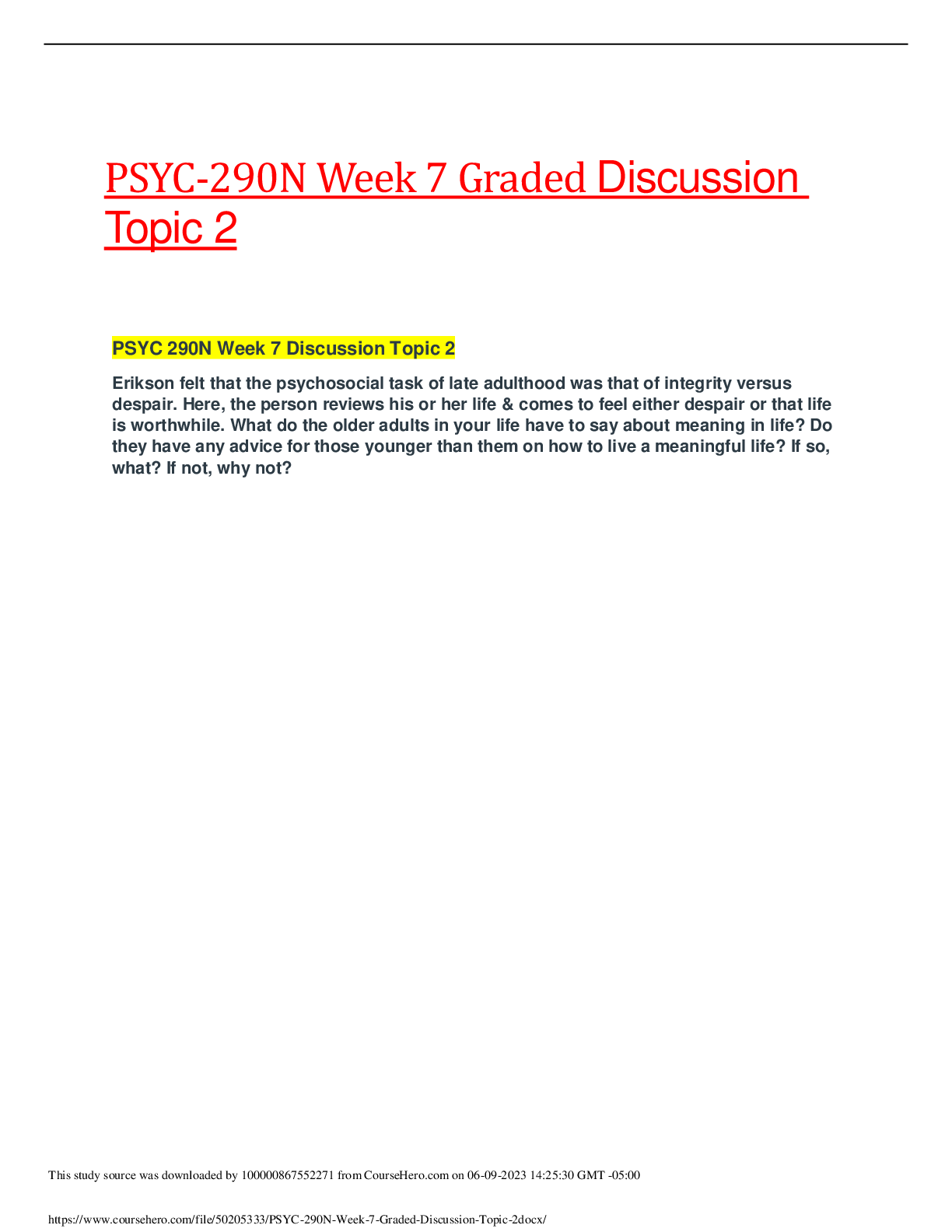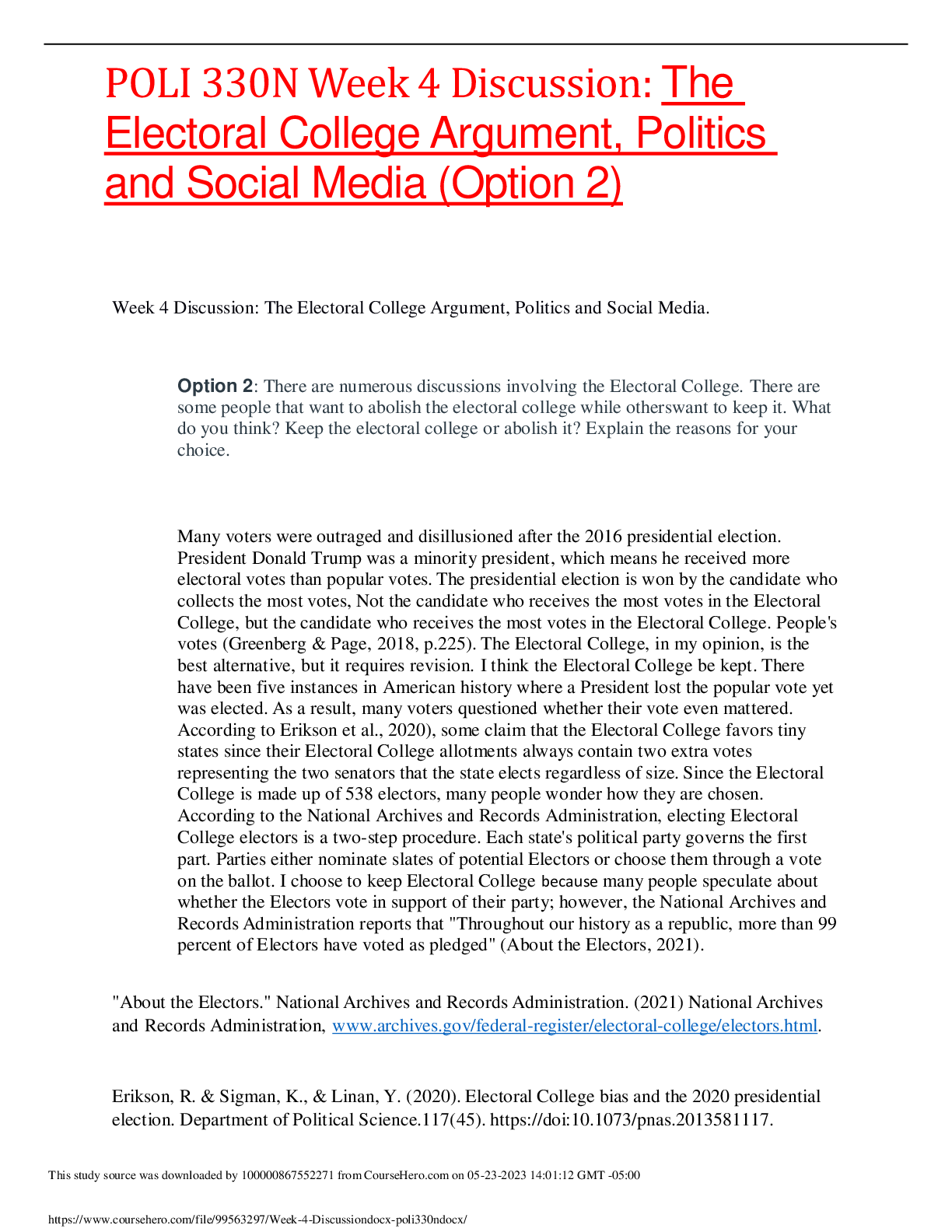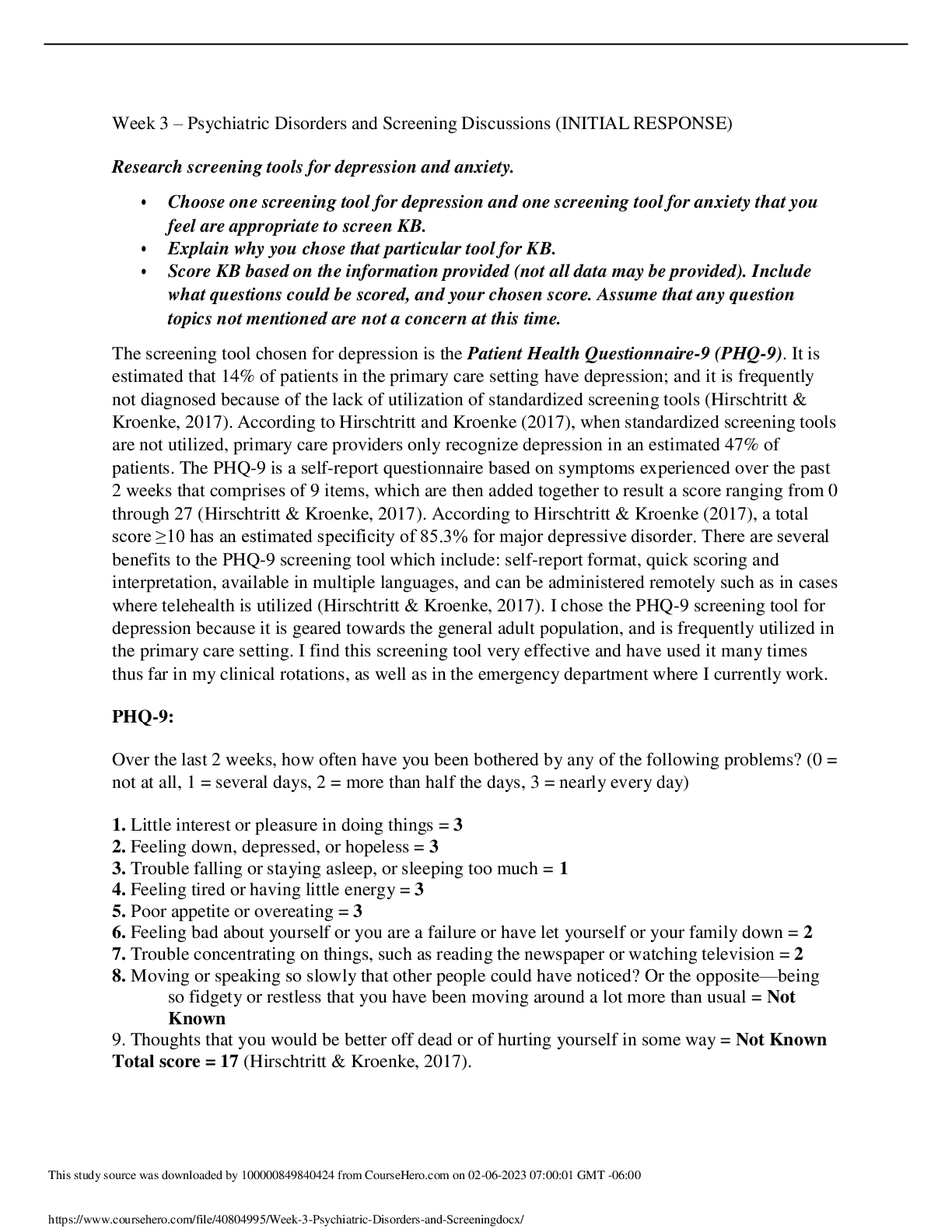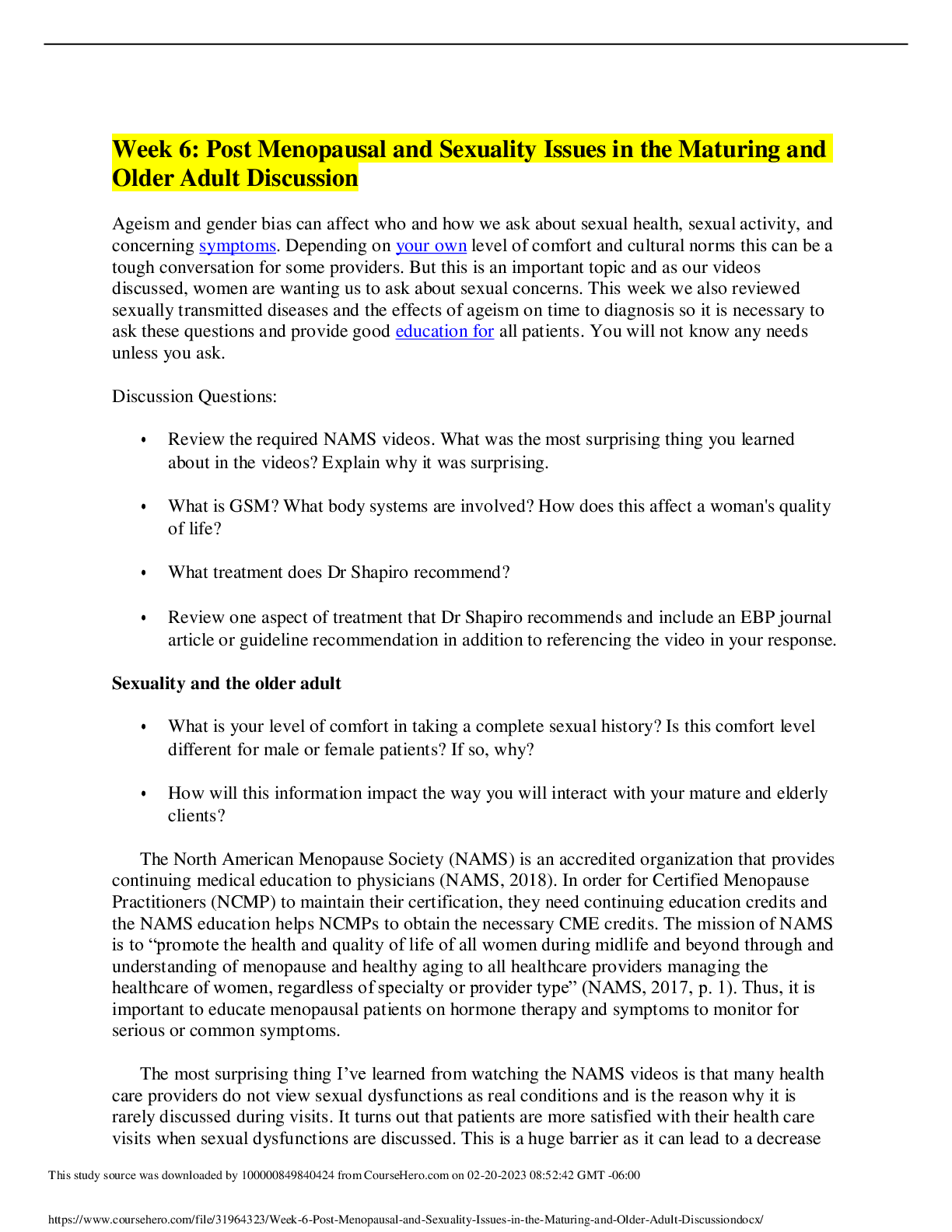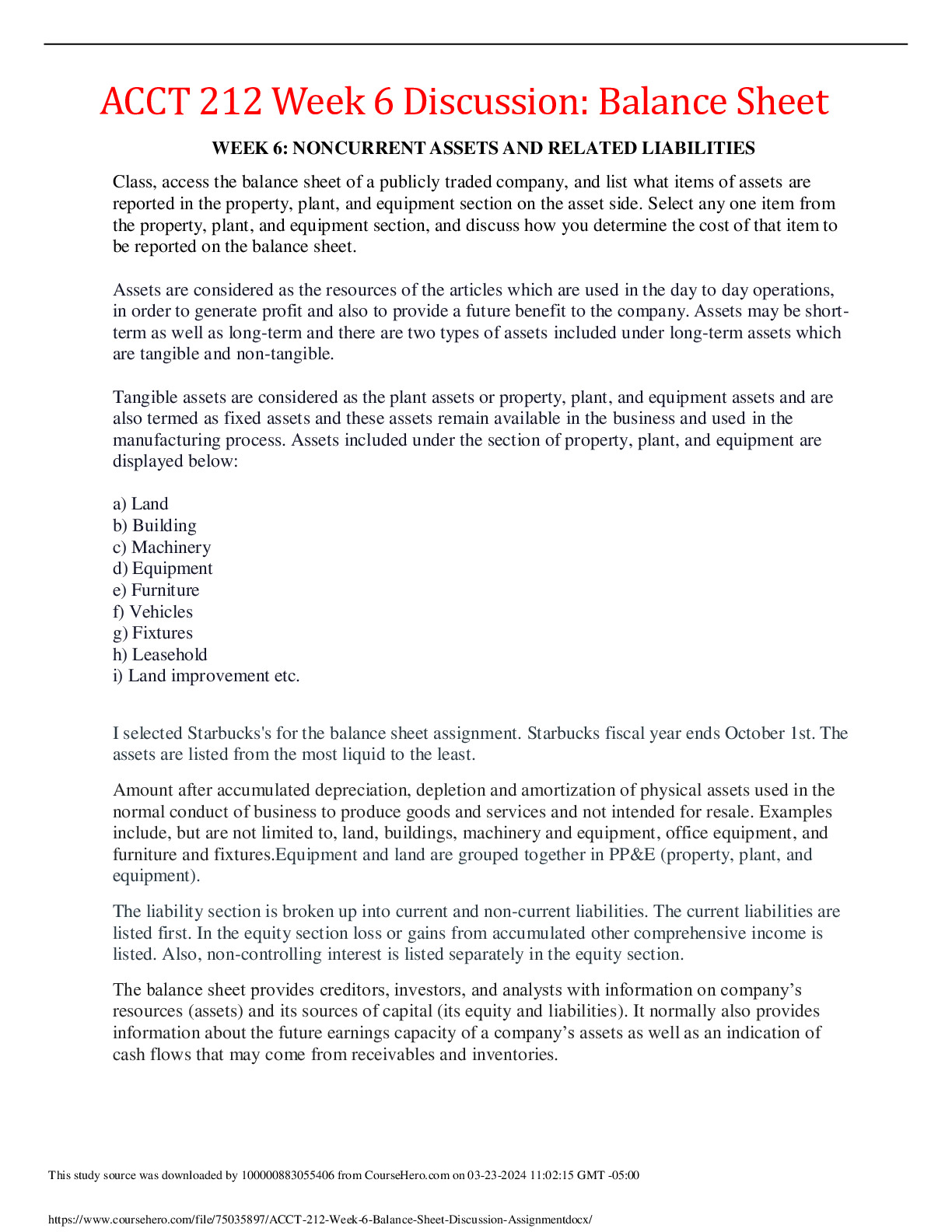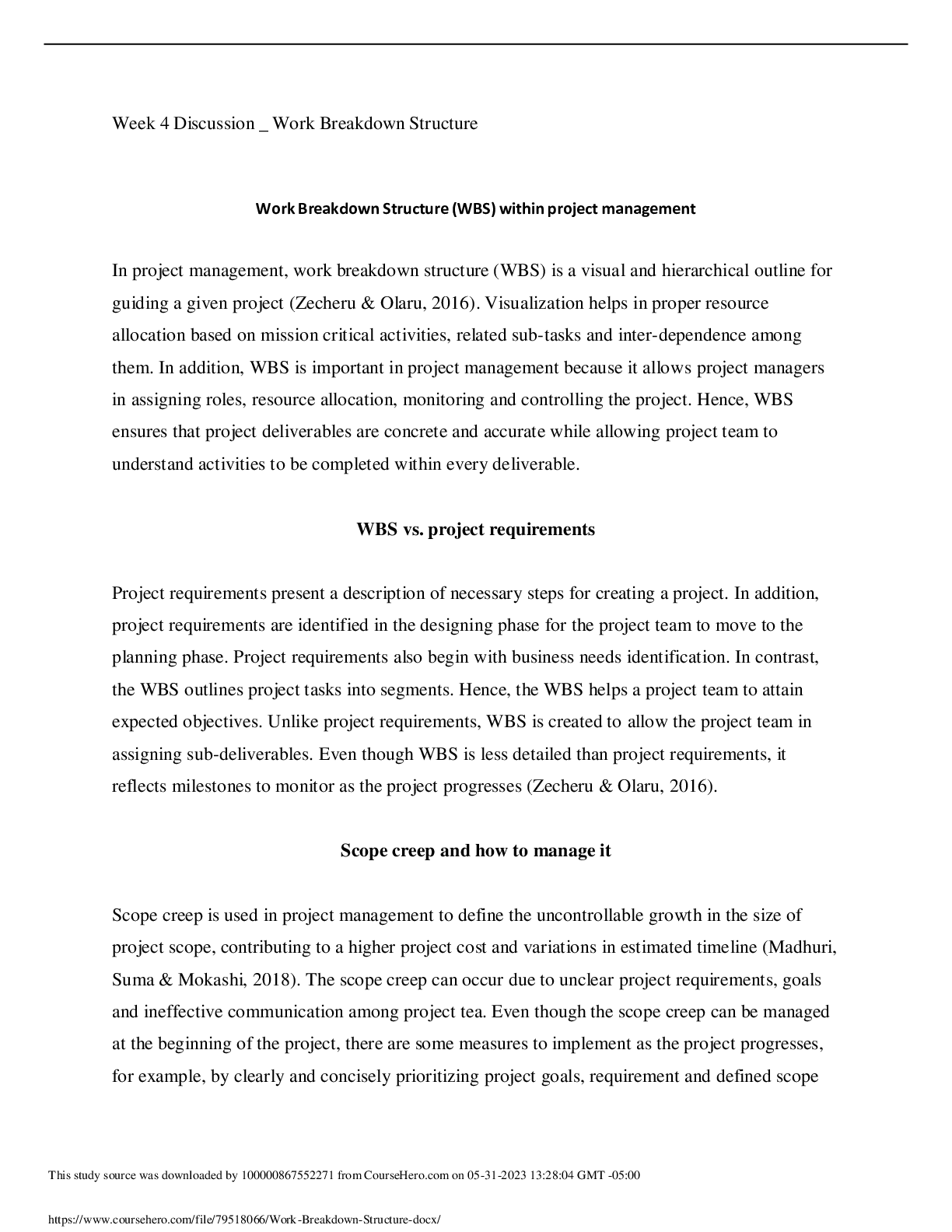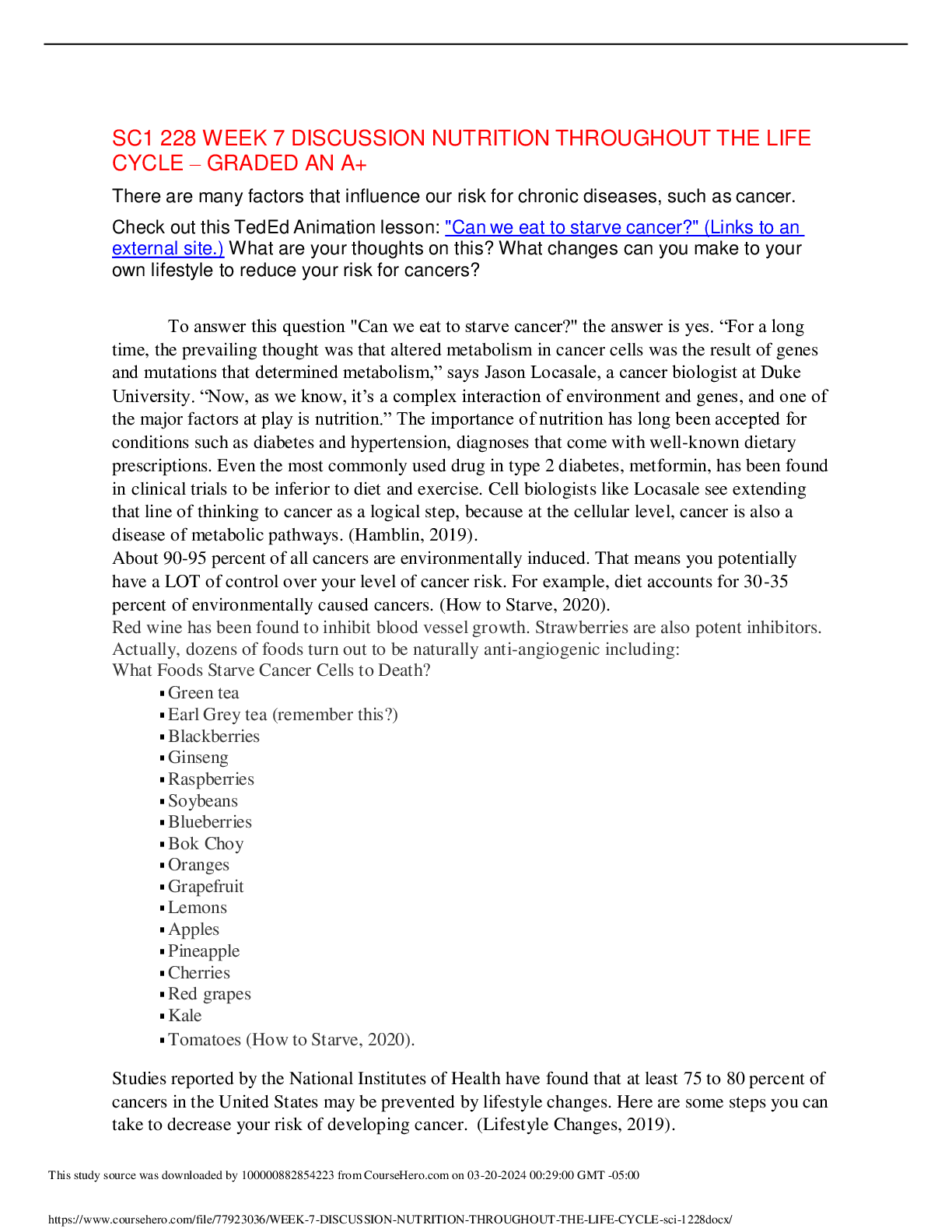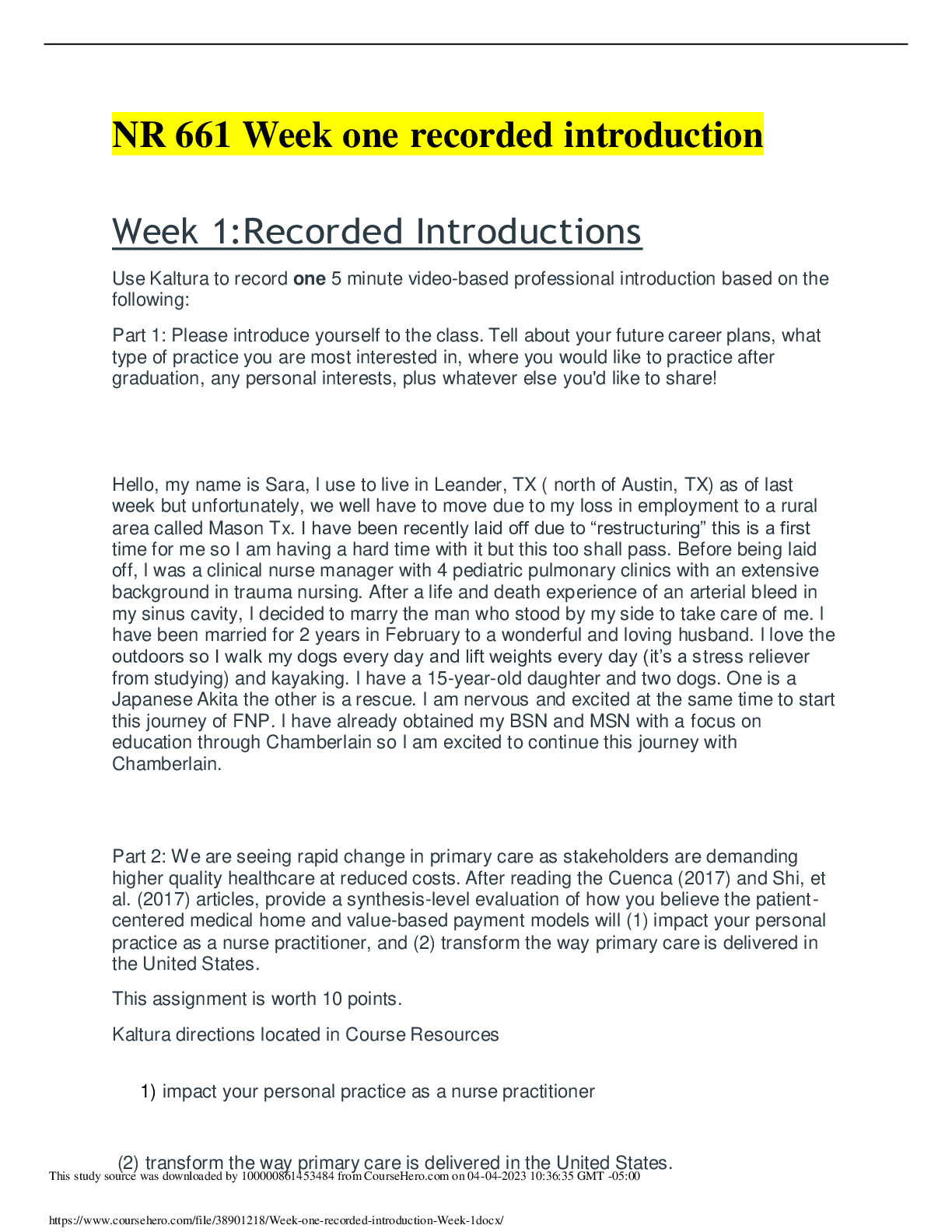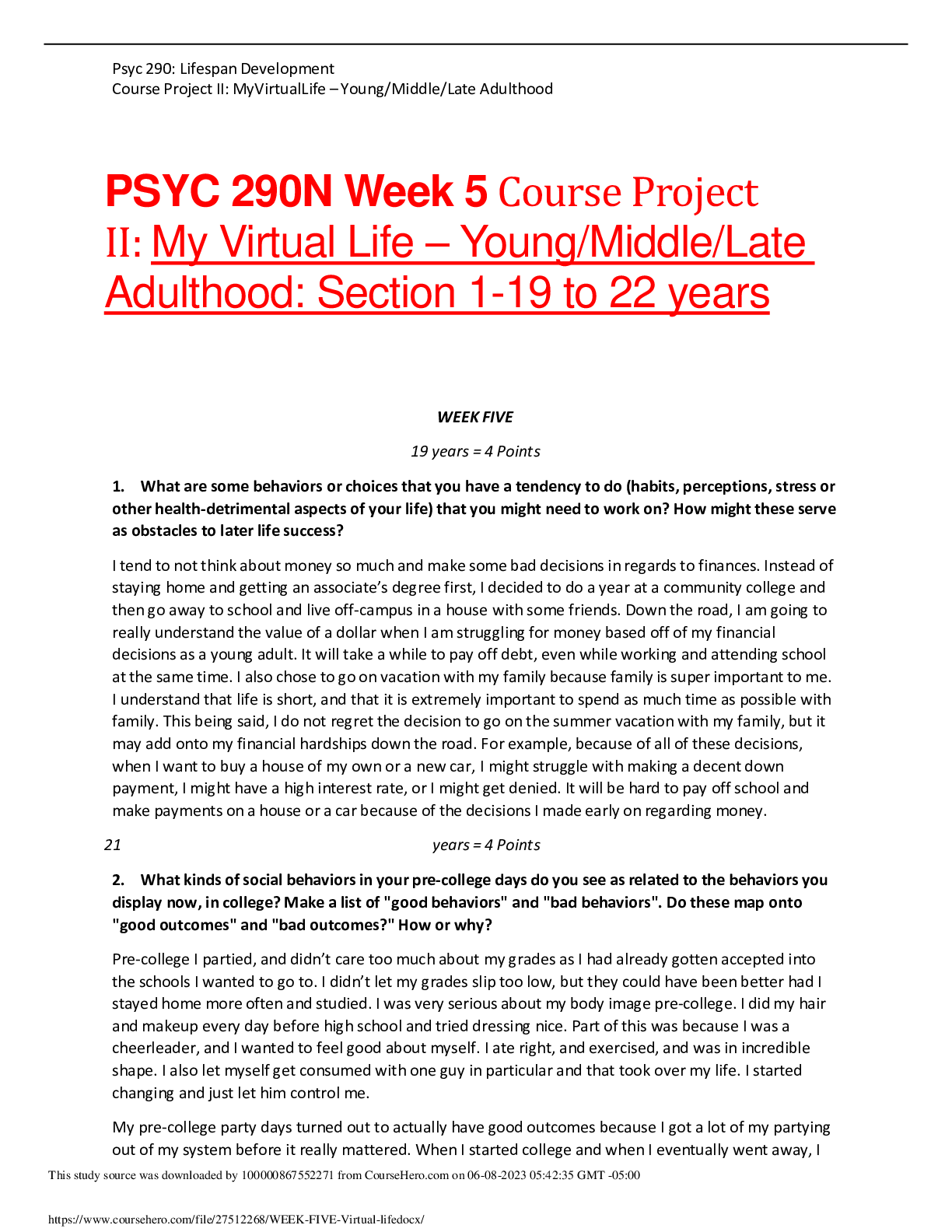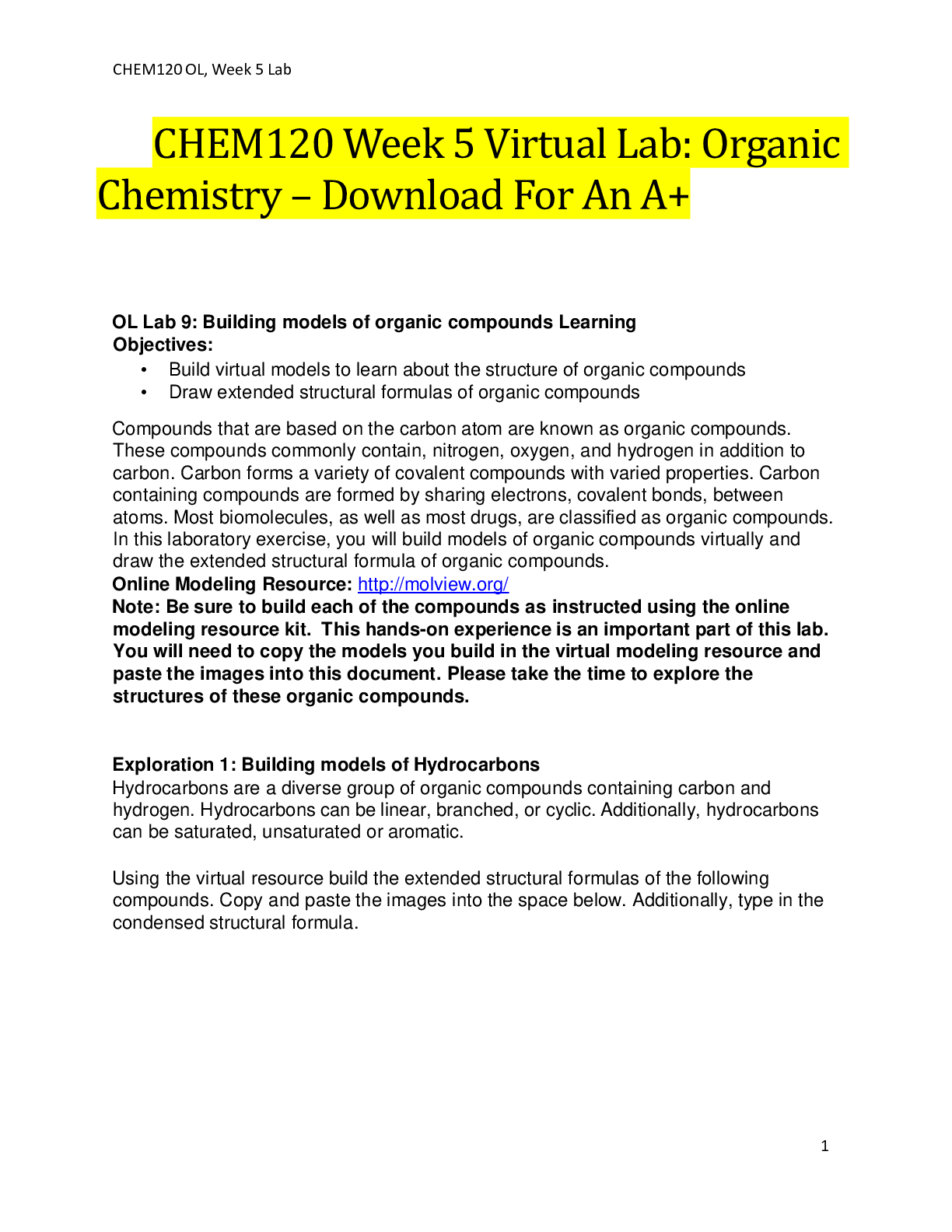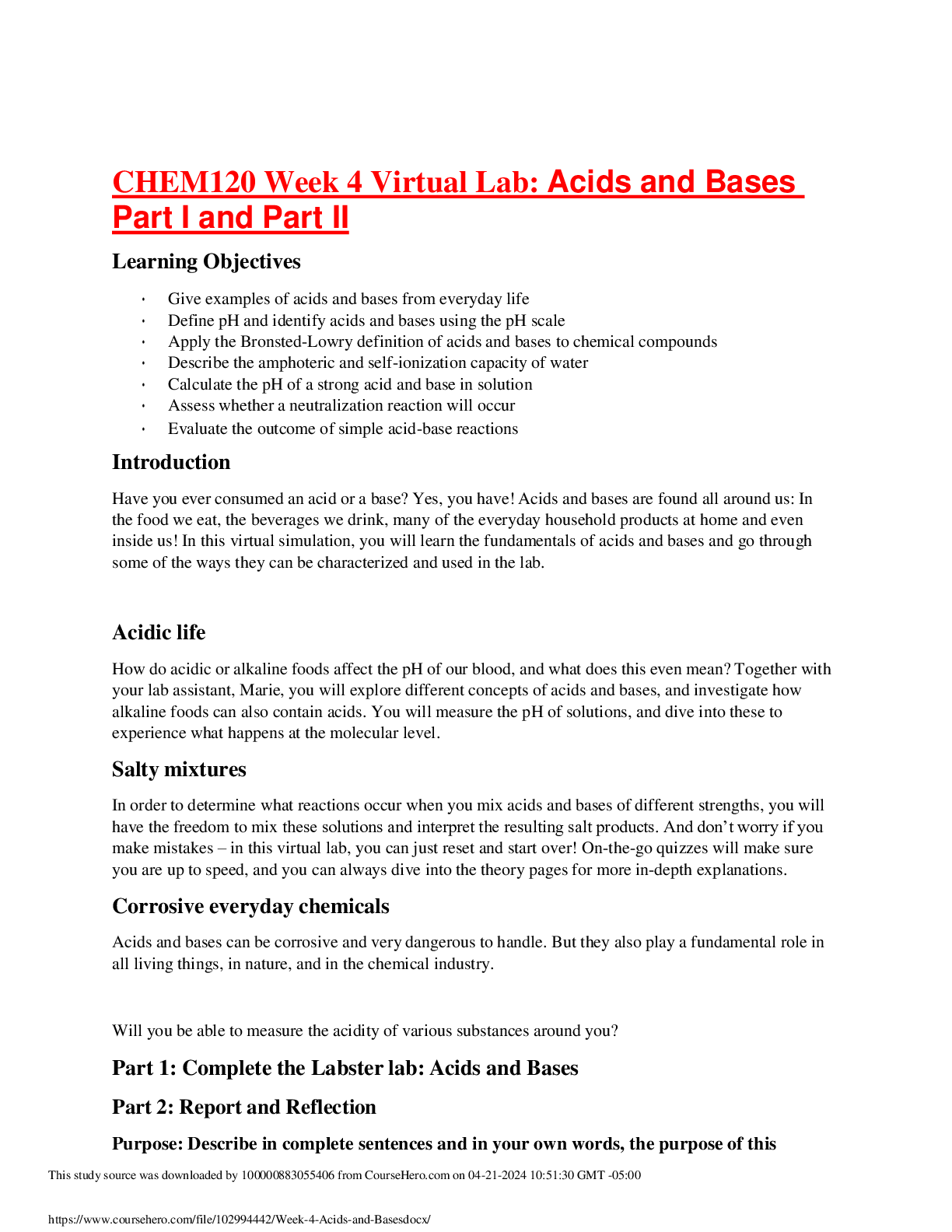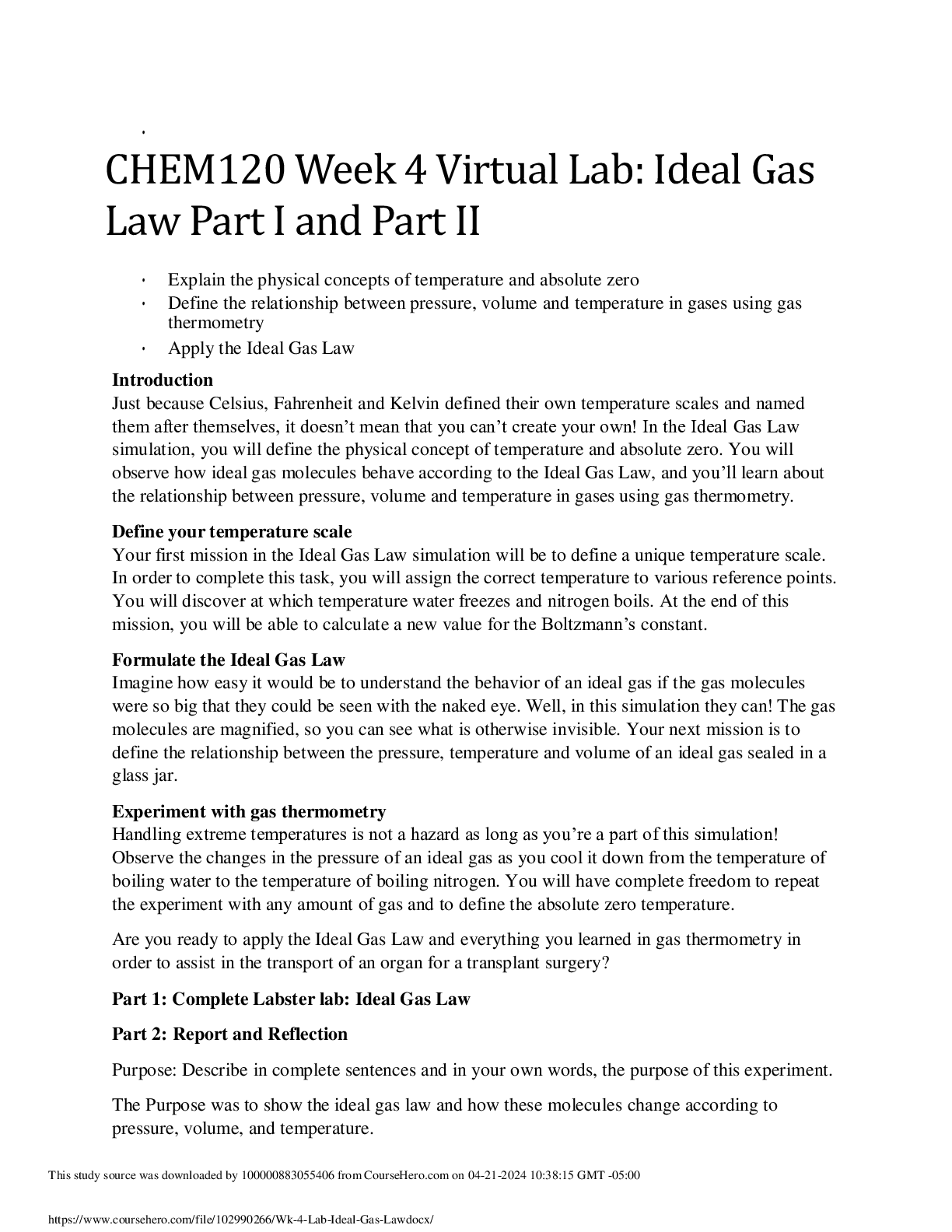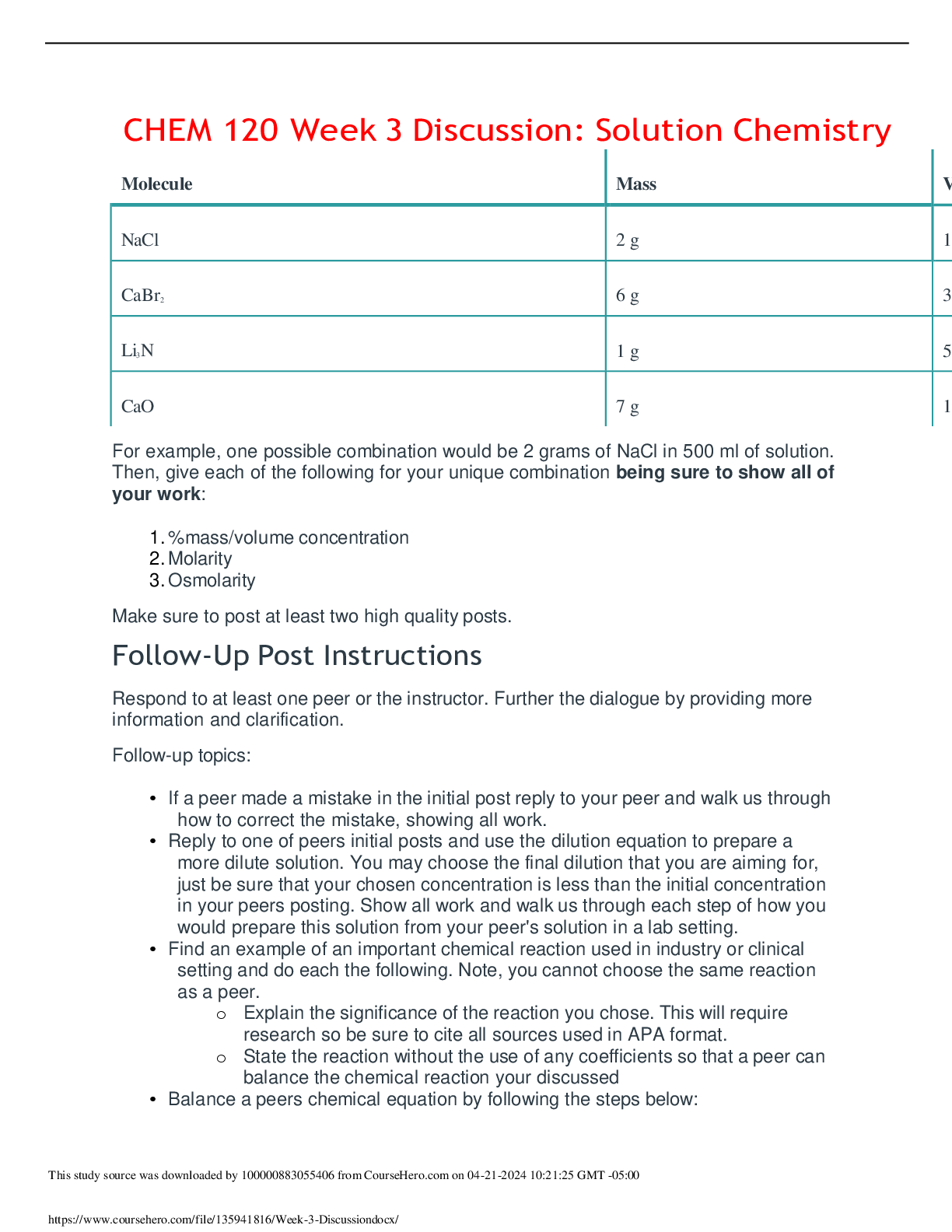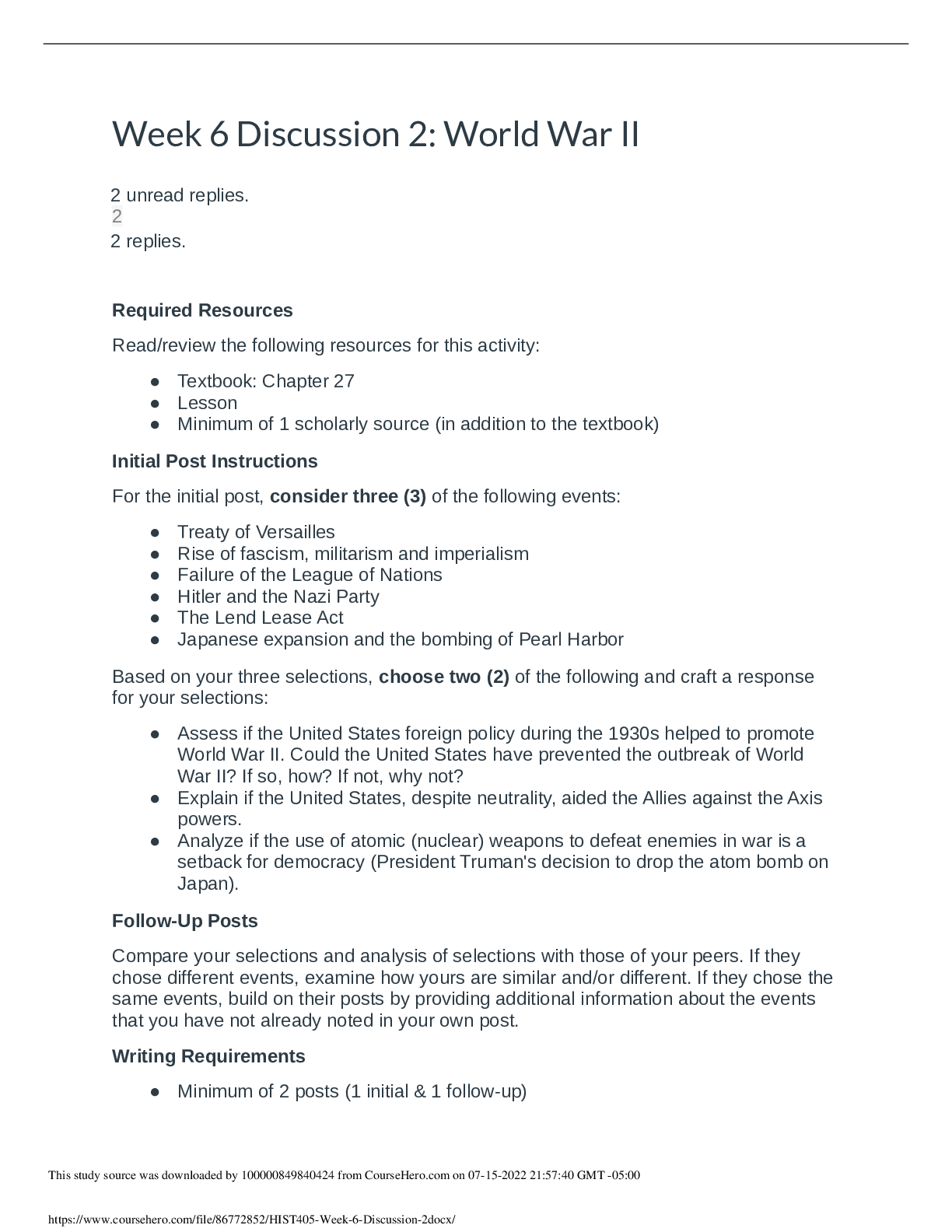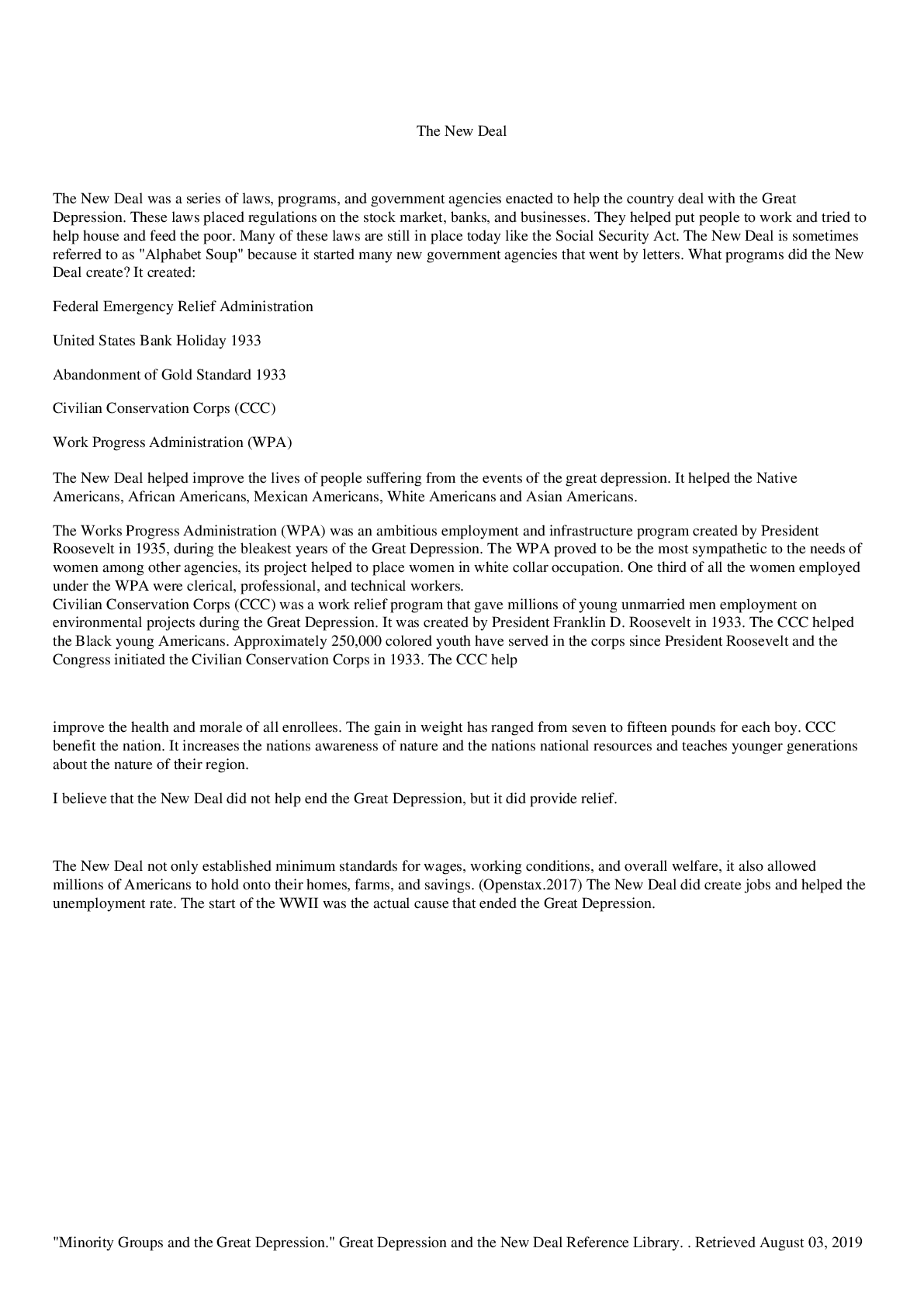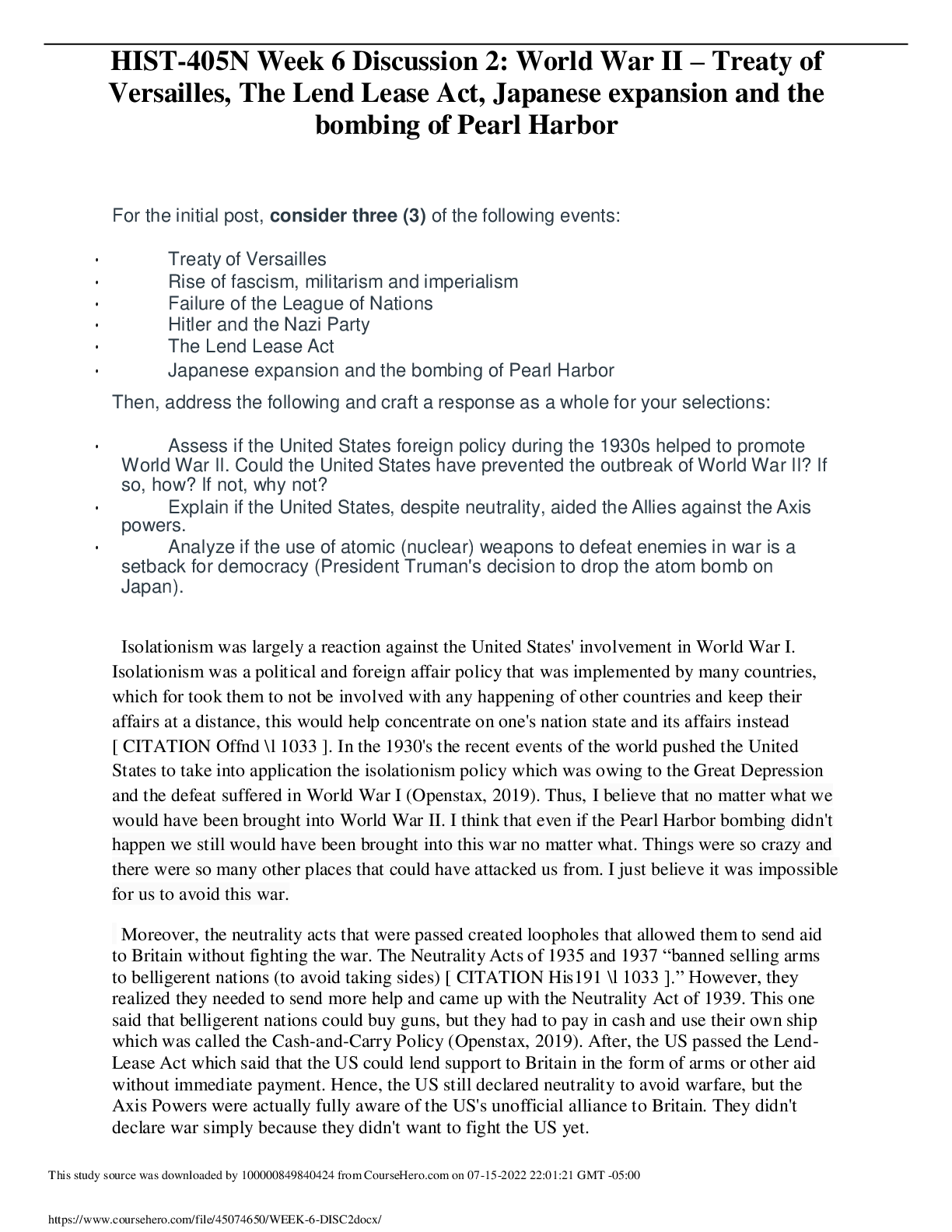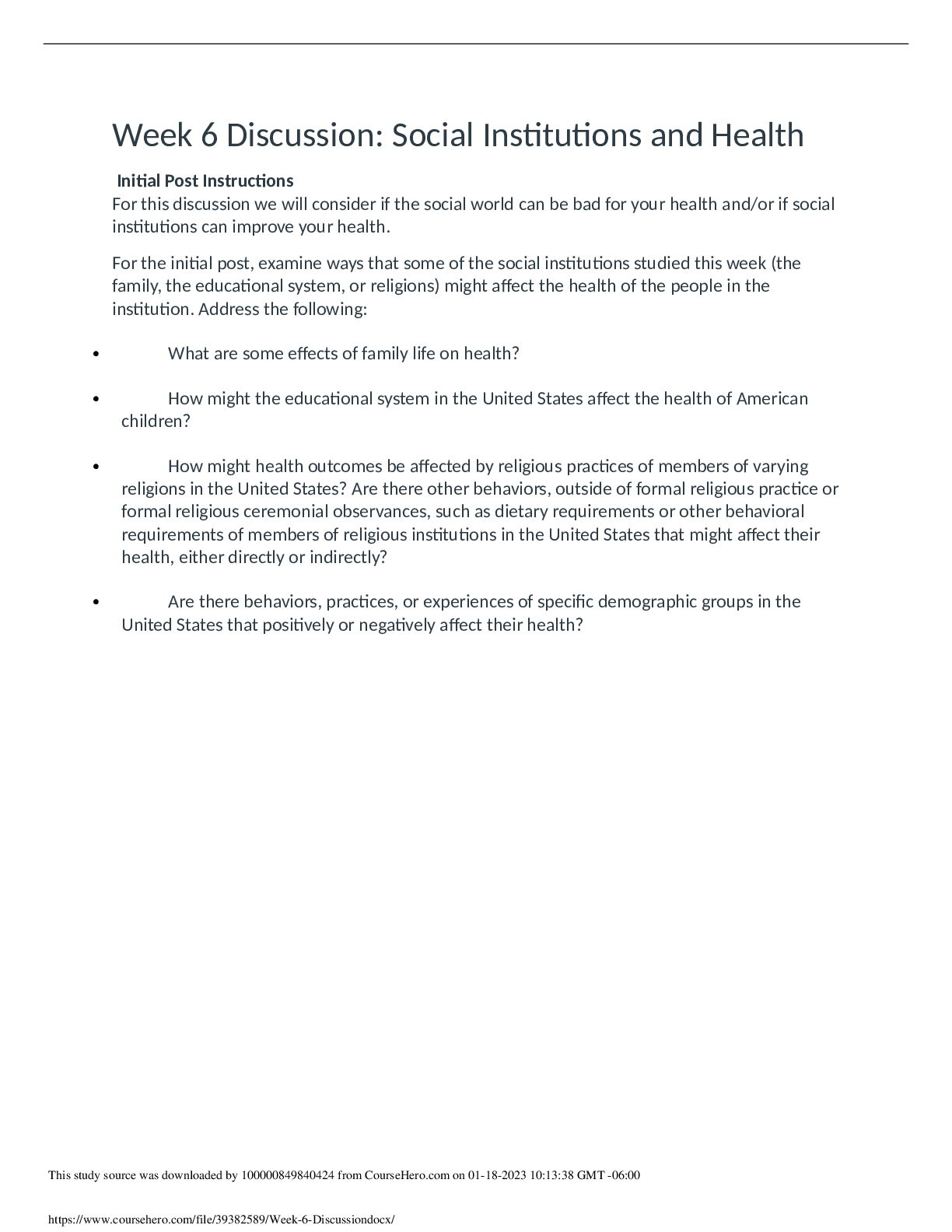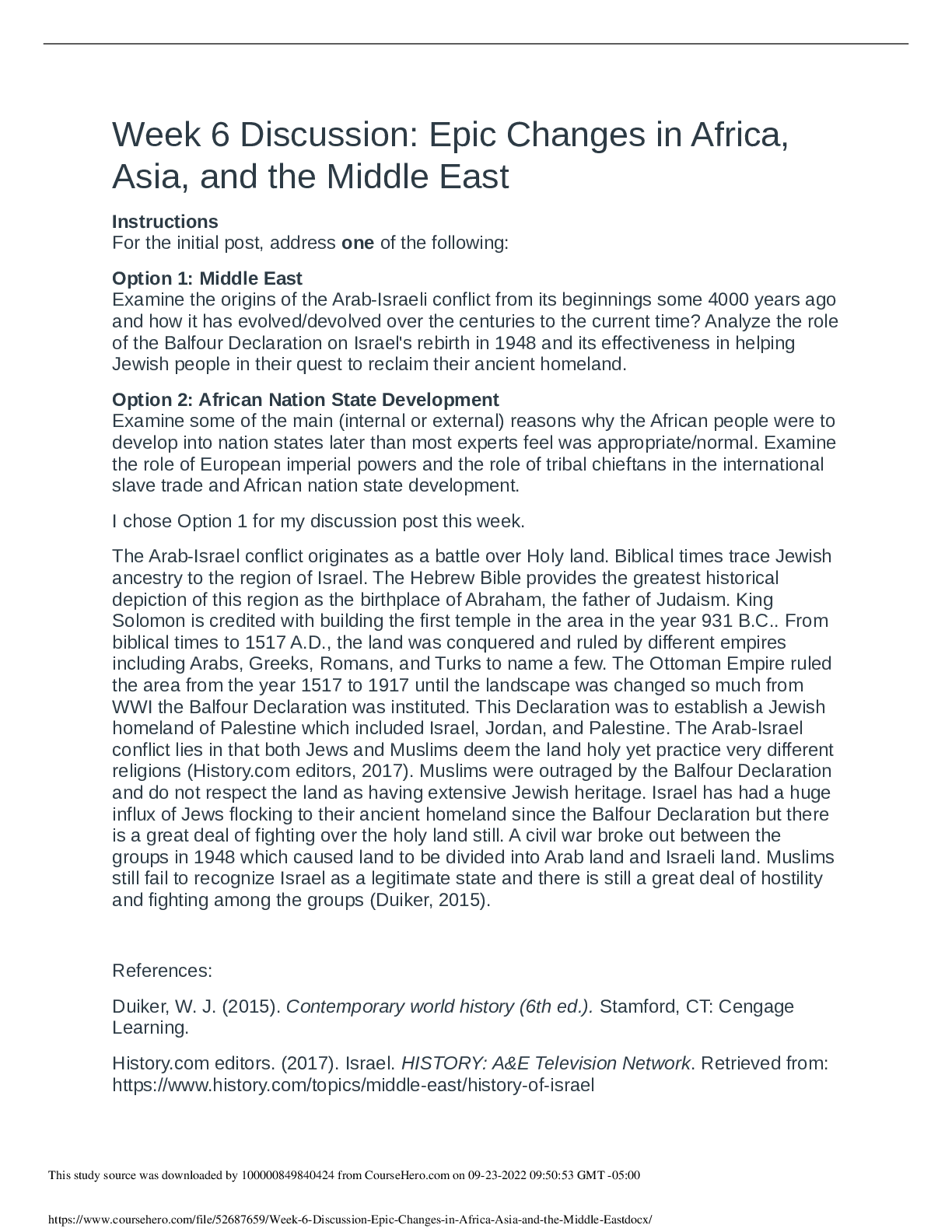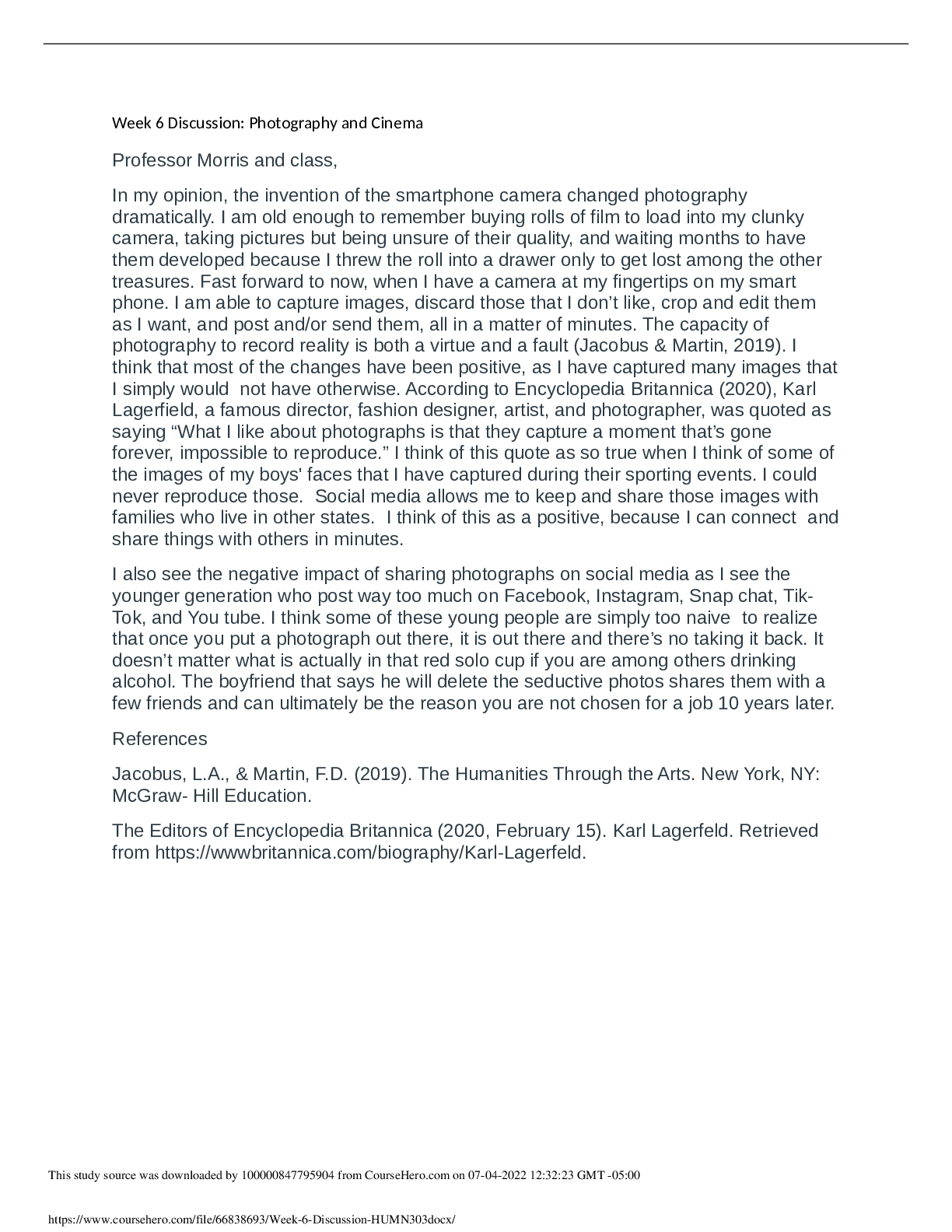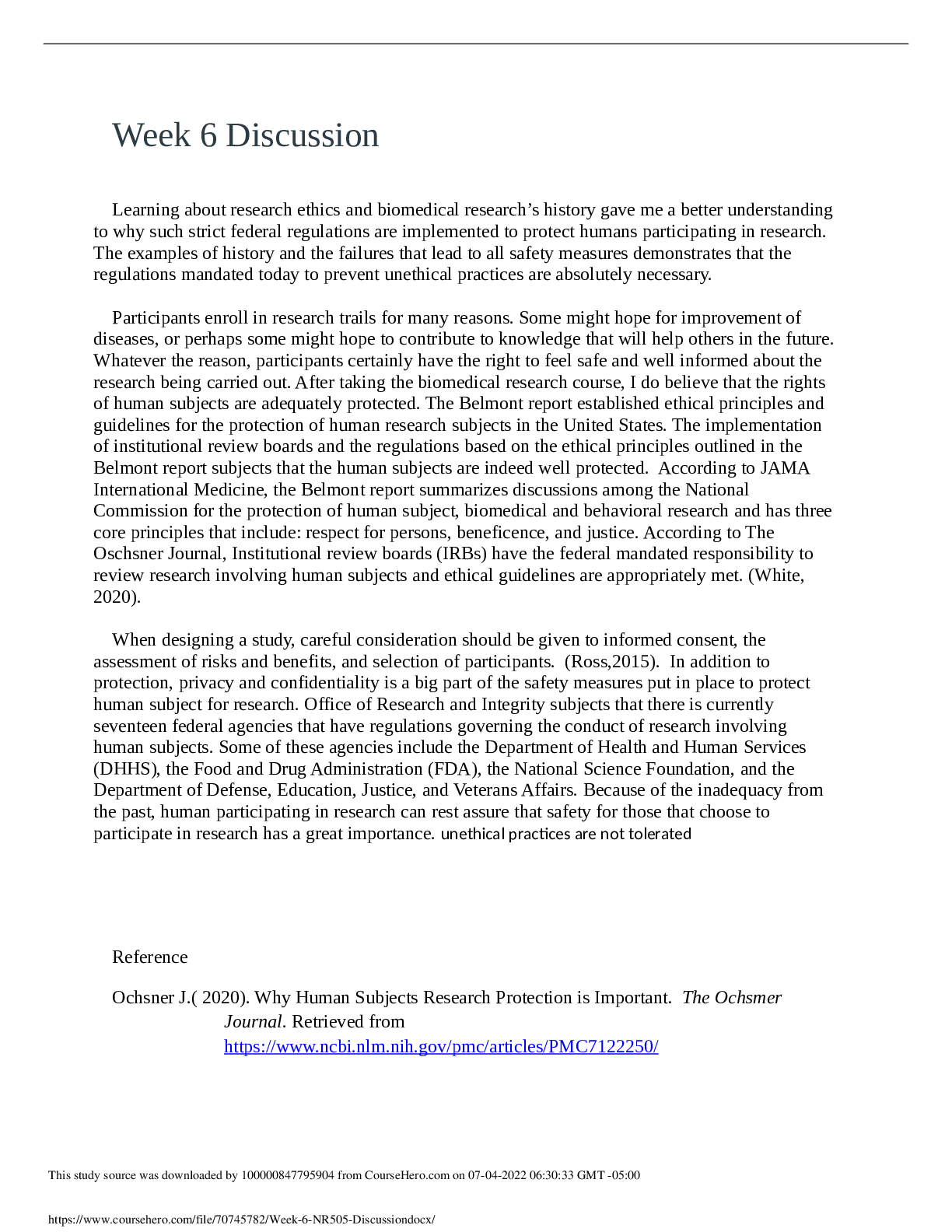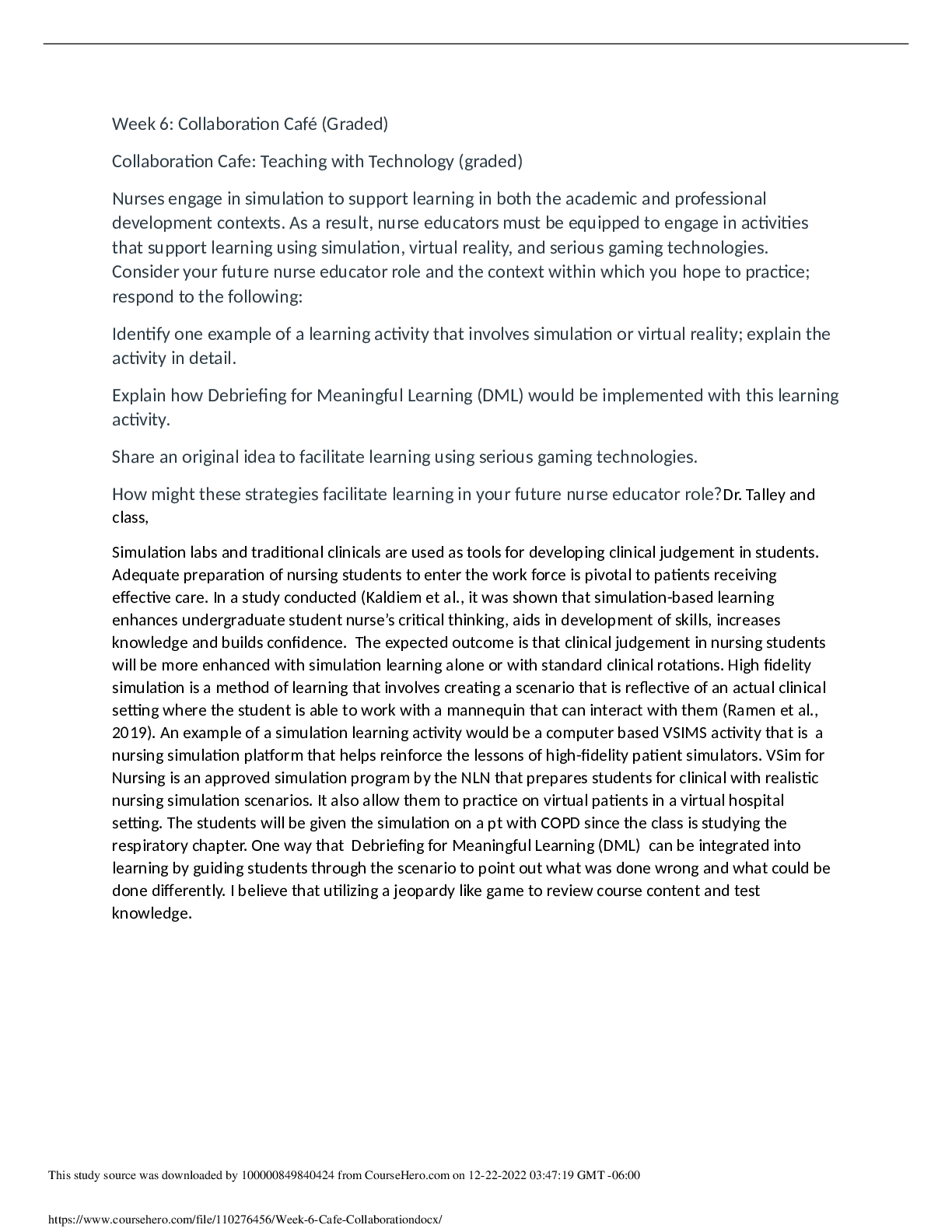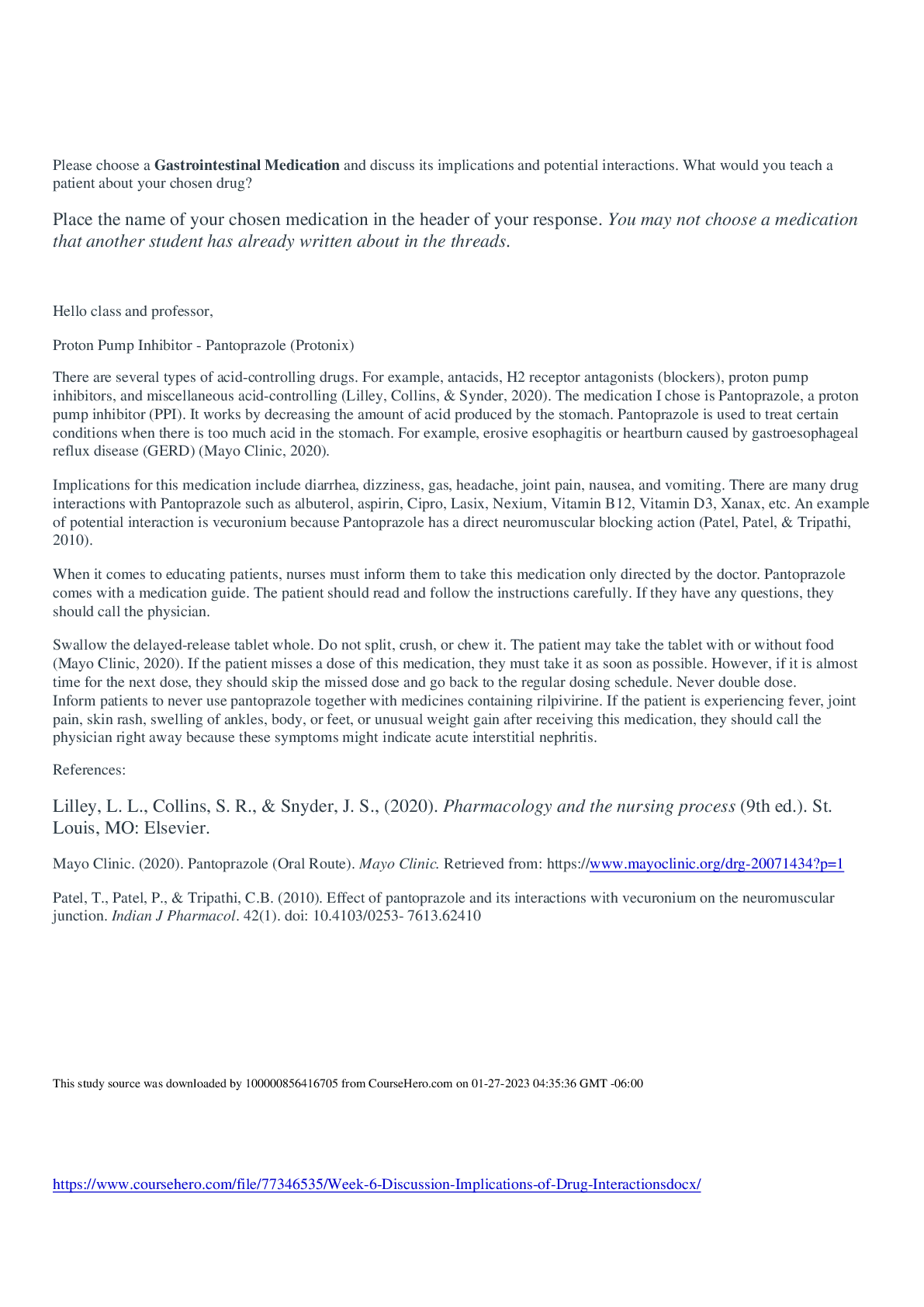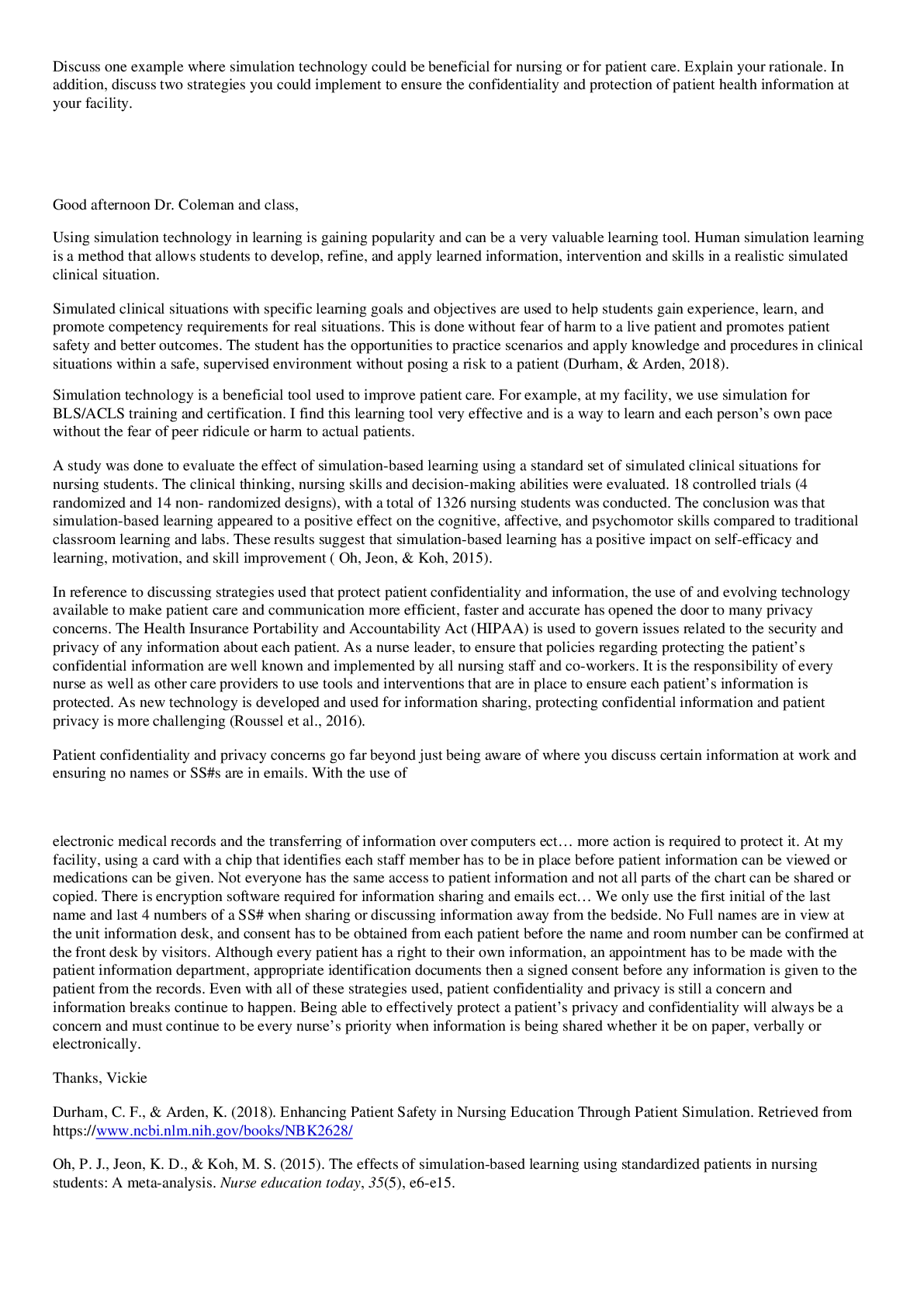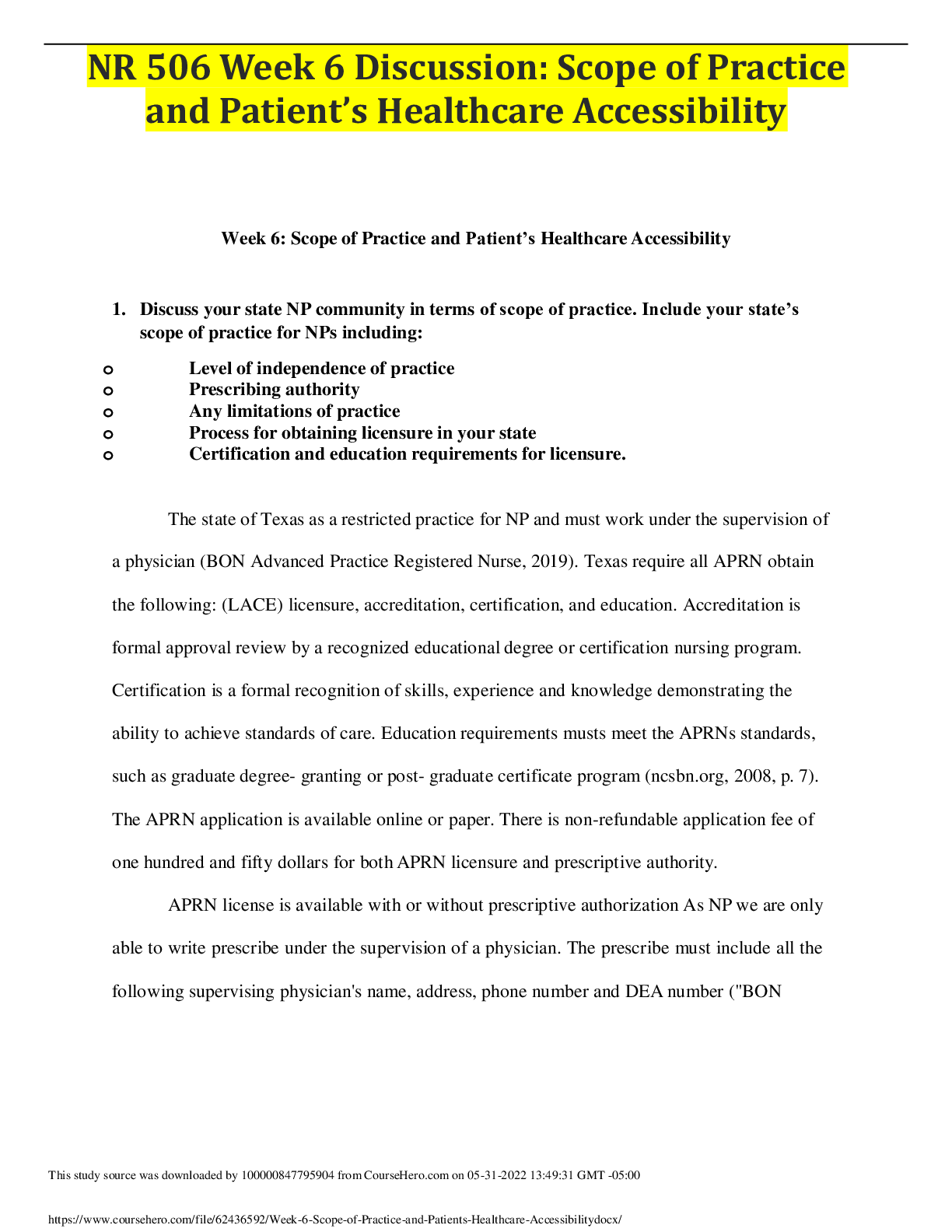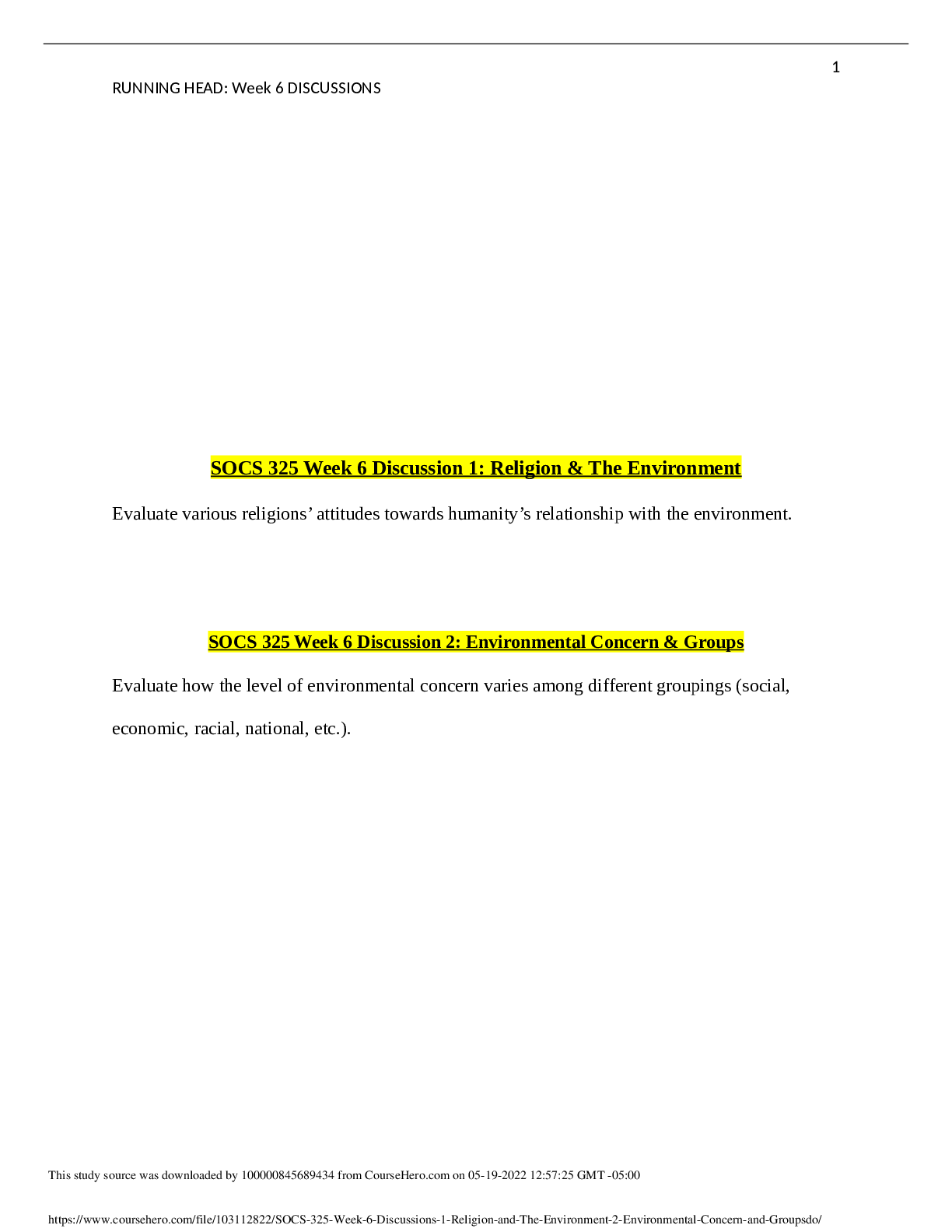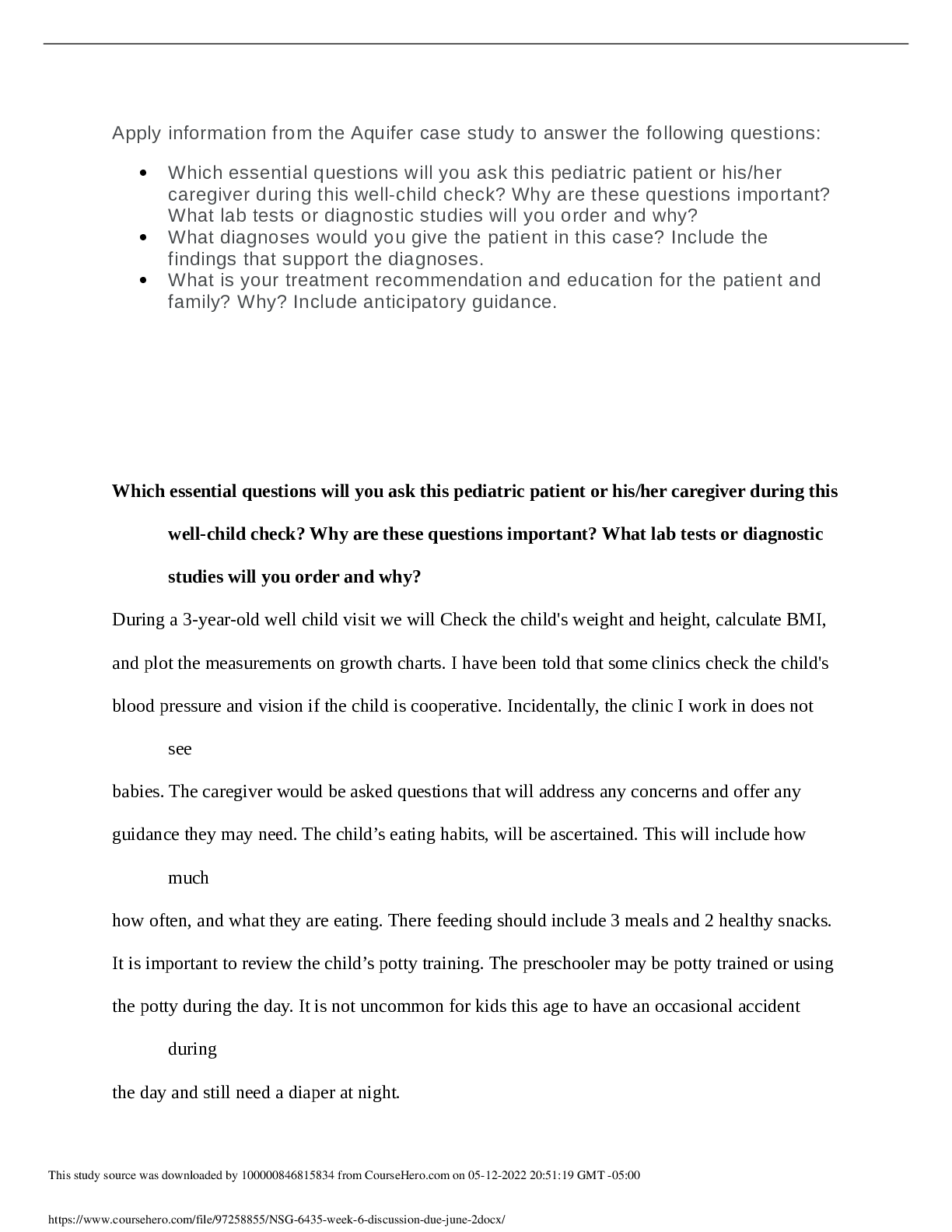Commerce > DISCUSSION POST > SBE 430 Week 6 Discussion Question 2 – Is E-Business Function Necessary (All)
SBE 430 Week 6 Discussion Question 2 – Is E-Business Function Necessary
Document Content and Description Below
SBE 430 Week 6 Discussion Question 2 – Is E-Business Function Necessary Internet Marketing Plan With the inception of the digital era, customer satisfactio... n has significantly become complex, prompting hoteliers to revise their corporate and marketing strategies. They are also forced to integrate technology to engage, acquire, service, and retain their customers across different digital channels and devices (Starkov, 2019). The contemporary hospitality industry is being reformed and characterized by adopting a 100% digital technology-enabled industry through online, mobile, cloud, IoT, AI, and blockchain tools and applications (Starkov, 2019). As a result, digital technology has become a tool for hotel operations, guests' services, communications, revenue management, CRM, and marketing (Starkov, 2019). However, most small-scale hoteliers have ignored the acquisition of digital technology. Some the hotels are overwhelmed by the amount of technology, data, digital marketing silos, and the need to work with many vendors in their guest acquisition and service efforts (Starkov, 2019). Some hoteliers are hesitant to invest in digital technology. The reluctant hoteliers fail to appreciate that they serve technology-obsessed customers who esteem a technology-driven hotel with a better experience than they have at home. In this digital era, the hotel industry should go way beyond the flat-screen TV or the property PMS and should focus on guest-facing digital technology applications and devices like streaming media hubs, voice assistants, messaging capabilities, mobile-first property websites, personalization technology, and one-to-one pricing and marketing applications (Starkov, 2019). The paper will devise a digital technology strategy for a small-scale hotel to market its services online and allow for online services such as bookings. The strategy will benefit the hotel businesses and the customers who would be able to ace the products and services at their convenience and in a reformed manner. The hotel business will allow customers to access food products, bookings, and online deliveries. It would be required to design a website with the help of an expert, who will tailor it to display the available menus, and the accommodation charges and be customer-based so that customers can make their orders online. Consequently, it should have a clear value proposition. Many businesses find it challenging to define their unique value proposition, as Francis (2018) asserts. As part of the value proposition, the Hotel will display images of the food it offers and the Hotel's interior, ranging from guest rooms conference rooms to entertainment villas. The images should be so that they draw the attention of web visitors while displaying the Hotel's unique qualities for all of its products. The Hotel will adopt a B2C strategy to maximize its online operations. The Hotel would require a comprehensive understanding of its market, distribution channels, and pricing options. For this online revenue model to work best, the Hotel should enhance its online visibility. It should consider such strategies as improving its search engine optimization, Google Ads, and social media to grow awareness and drive direct sales. Besides, it should customize its message for each segment. A hotel sale strategy should consider various customer segments with the information suiting their behaviors, desires, and needs. For instance, it should focus on meeting rooms, facilities, in-house dining, and transport links (Catala Consulting, n.d.). The booking process should be finetuned and allow for a fast booking process. The hotel staff should be available throughout for customers. These strategies ensure close interaction and contact with the customers, which can leverage its sales and customer loyalty. While hotels can sell their products and services directly to their customers or through intermediaries, it does not utilize a single channel to cater to all marketing and advertising. The Hotel will be required to optimize its brand and product exposure and increase its profit through third-party agents. Hotels can use marketing channels such as travel agencies, online travel service companies, and hotel reservation call centers (Tan & Dwyer, 2014). Channel conflict can occur when the existing channels chase the same customers with the same brand. Despite channels adding to the market arms for the hotels, there can be potential conflicts amongst the multiple channel patterns when different information such as pricing is advertised. The Hotel would be required to deploy strategies to avoid channel conflict and cannibalization. It can establish a minimum advertised price and strengthen its brand by offering exclusive products and services. The initial stages will not have many channel conflicts; however, with more advancements coming, the Hotel will consider other recommendations to avoid the conflict from occurring. The Hotel's website should be customer-centric, ensuring it meets the demands and needs of its customers and prospects. A robust customer-centric design requires the designer to consider the customer's place when developing a site. The website should be user-friendly while availing all the data required to make a buying decision. The Hotel should design a website that customers can easily use in their bookings, orders, and when making consultations. The Hotel's information should be displayed so that customers can easily access and understand it. Product-Based or Customer-Based Marketing Strategy Business entities require an efficient marketing plan to reach their potential clientele and provide a wide range of products that meet their demands. As a result, developing a lucrative marketing plan will enable your company to attract clients and encourage them to contact you (Aghazadeh, 2015). The product-based marketing strategy of the small-scale Hotel is very much associated with how customers are aware of its products and how they understand their value and unique selling proposition. The desire for one-of-a-kind items with exceptional safety features is high. This modest Hotel should think about web marketing tactics. It will carefully consider the four Ps of marketing. Product, pricing, promotion, and location are the four Ps of marketing. The services provided by the Hotel will be the product in this scenario. The price is the number of money clients will pay for the services. The Hotel will use multiple internet marketing strategies such as social networking sites and display ads to spread awareness about the services and goods. Massive catalogs surround website marketing. Generally, product-based marketing for small- scale hotels is more likely to benefit the business's web sales. They include significant promotion on various platforms to communicate product qualities and attributes, including social media, email, direct sales, online marketing, and display ads. Segmentation of the Market To offer quality products, depending on the market segment, the target market is very much related to the target audience's interests, sociodemographic, and general behavior characteristics (Armstrong et al. 2014). Customers who seek hospitality sector products and services at their leisure and in a reformed manner will be the potential consumers for this small- scale Hotel. Given this era of technological advancement, everyone wants to access products and services offered by the hospitality industry in a convenient and reformed way; so the products and services provided by the small scale hotel are likely to be aimed at all clients in the hospitality business as well as those who want to access food products, bookings, and online deliveries. Relevant Marketing Channels Marketing channels are the media via which goods and services are delivered to end customers. One of the relevant marketing channels that the Hotel can utilize is an official website. The Hotel will secure its competitive edge by properly utilizing its official website. The official website should be professionally designed, well-structured and comprehensive. This official website should allow for online booking, use visuals that speak to the experience visitors can anticipate, and provide further information on the area and any links the Hotel has with nearby sites, such as shuttle service, reservation service, and reduced tickets. Social media and online review sites are two further marketing avenues the Hotel may use. Online Marketing and Promotional Mix. The Hotel will need to promote its products and services using relevant internet marketing channels, such as media platforms, email, search engine marketing, and banner advertisements. The most effective online marketing method for the small-scale Hotel will be social media advertising. The COVID-19 pandemic has brought about stringent measures that have increased individuals' use of social media. Therefore, Advertising the Hotel's products and services on social media platforms will be more relevant for the company. Advertising, personal sales, public relations, promotions, and personal selling are the five important components of the promotional mix. These features must communicate to all potential clients the significance and quality of the Hotel's services and products. However, advertising its products and services on the internet is a better alternative for a hotel. B2B Activities The Product's Supply Chain A company's ability to expand and compete in the market depends on its ability to manage its supply chain effectively. The hotel sector requires a comprehensive and improved supply chain system to deliver items to end customers on time and properly. Even though the hotel industry is mostly dependent on direct selling, the supply chain for this small-scale Hotel will leverage several channels to accommodate all marketing and promotion. The Hotel will maximize brand and product exposure through third-party agencies while increasing profit. Travel agents, internet travel service providers, and hotel reservation call centers will be used as the Hotel's marketing outlets. Outsourcing or Offshoring The company primarily sells hotel sector equipment and services. Given the current pandemic problem and condition, the sale and expansion of hotel sector products and services appear to be highly important in the present and future. To operate and compete in the market and fulfill the present demand for products and services, the company will need to outsource to large-scale enterprises. This action will support the inventory of the items and assist in cost- cutting, eventually benefiting the firm. Once the company acquires a prospective client base from any viable location, it will contemplate offshoring. Third-Party Distribution or Sales Any firm other than the manufacturer or producer makes third-party sales. The Hotel will maximize brand and product exposure through these agencies while maximizing profit. Travel agencies, internet travel service providers, and hotel booking call centers are examples of third- party agents. E-Commerce Environment Selling goods online requires a company to pay taxes like traditional businesses. Electronic commerce businesses are required to pay sales tax. The legislation requires a sales tax nexus, which determines the relationship between an electronic commerce business and the state or some tax jurisdiction (Ndonga, 2021). A business that makes sales in a state electronically is required to pay tax, but a minimum threshold of sales is set to be met by the company. Therefore, states can collect taxes from their members (Ndonga, 2021). Additionally, a hotel would have to attain a certain sales threshold to pay sales tax to a certain state if it delivers its services to people in that state. Several ethical issues influence online transactions. They include online privacy, where the customers' identities should be hidden. In addition, a privacy issue for a company's employees regards tracking. Since companies track email and web activities, it is important to know how secure the customers' privacy is (Turban et al., 2019). Intellectual property theft and copyright trolls are also challenges associated with electronic commerce. In this case, books and music are sold by non-original owners who ask for payment. In this case, the originator does not earn. The Hotel should adopt several ways to impact the environment. In this case, the company needs to ship products more efficiently. The Hotel should wrap their products with decomposing materials and start recycling the packing tins and other materials used to transport them (Junior et al., 2018). The Hotel can also decide to use renewable sources of energy where they apply solar and wind to reduce energy bills. That way, the companies will reduce environmental pollution (Junior et al.,2018). These are the strategies that a company could apply to reduce the environmental impact. E-Commerce Software The Hotel needs web hosting to become visible to its online customers. In this case, the Hotel could need Email Accounts which it can apply to communicate with its customers online and deliver messages to them. Besides, the Hotel requires a website to post its products and a method where people could pay money for its services using its website. The Hotel also requires databases that store information concerning its performance over time. Web hosting helps the Hotel in a significant way. Application integration needs mean that hotels should integrate data, processes, and resources among organizational applications. It involves combining and improving workflows across software to increase efficiency (Kujala & Halonon, 2018 December). The Hotel needs to integrate its enterprise resource system to ensure that it coordinates the communication and cooperation of its staff during the work operation. In addition, the whole system should be integrated to coordinate the services offered to check areas that need improvement. These are some of the Hotel's needs, which would boost its operations. Commerce service providers are companies that offer services to online businesses with the applications they need. They could require product catalog management, where the service provider can help the Hotel manage its catalog of products and services (Febrian & Vinahapsari, 2020). In addition, they require online payment services from the service providers since executing business online requires the Hotel to require customers to make their payments online. Transaction processing is another service that the hotel needs, and in this case, they will require their transactions to be processed for management to know about them (Febrian & Vinahapsari, 2020). These are some services that the hotel needs. Security and Payment Systems Customer Data and Privacy Policy A data privacy policy is crucial in ensuring compliance with various privacy legislation while setting expectations from the customers and website visitors. A properly-outlined privacy policy informs the visitors or individuals on an understanding of the type of data that a company collects, the reasons being collecting the information, and the way that information is used (Guru et al., 2020). Henceforth, a data privacy policy defines a legal document on the online platform detailing how the visitor's data can be used (Virupaksha et al., 2017). It should be easily accessible to visitors right from the first page and on any other page they visit, defining the reason it is often linked in the footer content Type of Information Collected The personal information collected includes the natural person's data that can be used to directly or indirectly identify the visitor. When signing up for the website, this information comprises the customers' data after reviewing and agreeing to the terms and conditions, including their contact details (phone numbers, names, physical addresses, emails, and transaction history). The sensitive personal information collected defines information including their sign-in details such as passwords and other critical information such as their credit card or other payment tool details, biometric information, national identifiers, and other relevant information that will assist the seamless customer service rendering and security purposes. The data provided by the customers in the eCommerce platform is held by the hotel business associated with maintaining the customer accounts or processing user applications, bill payments, or shopping cart services. The non-personal data entails the customer's device IP address used to access the website coupled with other details like the browsing details, the device's operating system used, and the redirecting website's name. The website will also use cookies to collect information from consenting customers for better service provision by majoring in online preferences. Purpose of Collecting and Using Personal Information The Hotel shall use the information to manage the business and provide an enhanced customized experience on its website. The collected data will also be critical in various other functions ranging from processing applications, requests, and transactions; maintaining the internal records; providing services to the customers; adhering to all the legal requirements; recognizing the customers while they are conducting online transactions; understand the demand and offer relevant product promotions and offers. Suppose the customer ceases to provide consent to use their sensitive personal information. In that case, the Hotel shall henceforth withdraw from providing a personalized experience and other services for which the sensitive information was used. Information Sharing or Disclosure The Hotel will not release personal information about its customers without their prior agreement unless the disclosure involves a mutual consensus between the hotel and the clientele or is required by law. If the Hotel provides personal information to other parties, they will be legally obligated to secure such information in line with existing laws. Payment System For any online transaction, it is critical that the merchant, the business offering the services or online products, find a suitable online system to facilitate complete transactions upon customer order requests (Guru et al., 2020). In such a transaction, a customer requests services or products in the online store. A gateway receives the transaction and forwards it to the payment processor, the relevant bank, and the merchant. In the case of the Hotel, PayPal will be used for online payment. Implementation Objectives The Hotel aims to serve a vast population through a rigorous marketing strategy ranging from website ads to social media advertisements and a robust website search engine optimization. Additionally, this marketing plan purposes to: 1. Increase sales and revenue 2. Improve and enhance the hotel brands notoriety 3. Obtain new customers and increase customer loyalty 4. Improve the customer relationships to enhance existing customer retention 5. Build a strong competitive advantage Key Performance Indicators While pursuing the objectives, it is critical to track the progress and the outcome to determine if they were achieved or not. When the time comes to assess performance, it is critical to establish Key Performance Indicators previously established key performance indicators (KPIs) (Pal, 2019). KPIs are units of measurement used to determine the efficacy of the objectives. Such keys as to be used in this business include the sales revenue, whose value will be directly proportional to the outcomes, and web and organic traffic which will define the most visited searched or followed links. It will be easy to determine the number of people accessing the Hotel's website (Ghahremani-Nahr & Nozari, 2021). Social media engagement will also be used to measure the objectives' success through the assessments of social media post interactions, likes, engagements, and other relevant reactions, which will provide the taste of the brand's reputation and other critical information such as customer satisfaction (Pal, 2019). Conversion rates will be used to determine the goals by analyzing the website's desired actions (Ghahremani- Nahr & Nozari, 2021). Lastly and importantly, the cost per lead will also determine the marketing plan's success, including comparing the amount spent to get customer leads and whether higher than the lead spends to make an online purchase. Risks and Mitigation One of the most profound risks in the online sphere is privacy. Everyone values their privacy, yet many people give it up much too easily online (Virupaksha et al., 2017). Because most online forms have minimal requirements for information sharing, you mustn't disclose more than is necessary (Guru et al., 2020). It is particularly true in establishments that collect payment information. The Hotel will endeavor to collect only crucial information and demand robust user authentication to avoid fraudsters. The online payment method can also be a risk factor. In this case, our choice is PayPal. PayPal is an excellent option for online buyers since it protects their purchase 45 days after the transaction (Toader, 2014). As a result, the customer's transactions will be protected against identity theft and fraudsters. Next, proper pricing can be challenging, given that there is a need to offer customized customer prices and promotional deals. Also, checking the competitors' price ranges is a critical issue given that customers have a wide range of options, and with a single click of a button, they can switch to different avenues (Guru et al., 2020). The customer's personal information and business analytics software will be critical in mitigating these issues and providing better suggestions for market prices and personalized customer prices. References Aghazadeh, H. (2015). Strategic marketing management: Achieving superior business performance through intelligent marketing strategy. Procedia-Social and Behavioral Sciences, 207, 125-134. Armstrong, G., Adam, S., Denize, S., & Kotler, P. (2014). Principles of marketing. Pearson Australia. Catala Consulting, C. 14 Highly Effective B2B & B2C Hotel Sales Strategies. Retrieved 13 March 2022, from https://catalaconsulting.co.uk/14-effective-b2c-b2b-hotel-sales- strategies/ Febrian, A., & Vinahapsari, C. A. (2020). Brand equity s mediated in influencing purchase intentions on e-commerce. Journal of Engineering & Management, 3703, 3703-3710. Francis, S. (2018). A Unique Value Proposition Drives Powerful Hotel Marketing | Blue Magnet Interactive. Retrieved 13 March 2022, from https://www.bluemagnetinteractive.com/blog/unique-value-propositions-hotel-marketing/ Ghahremani-Nahr, J., & Nozari, H. (2021). A Survey for Investigating Key Performance Indicators in Digital Marketing. International journal of Innovation in Marketing Elements, 1(1), 1-6. Guru, S., Nenavani, J., Patel, V., & Bhatt, N. (2020). Ranking of perceived risks in online shopping. Decision, 47(2), 137-152. Junior, J. A. G., Busso, C. M., Gobbo, S. C. O., & Carreão, H. (2018). Making the links between environmental protection, process safety, and industry 4.0. Process safety and environmental protection, 117, 372-382. Kujala, V., & Halonen, R. (2018, December). Business Growth Using Open Source e-Commerce and ERP in Small Business. In International Conference on Intelligent Systems Design and Applications (pp. 147-158). Springer, Cham. Ndonga, D. (2019). International taxation of e-commerce business income. The International Tax Journal. Pal, S. (2019). Understanding the impact of marketing transformation on sales and marketing alignment. Journal of Brand Strategy, 8(1), 48-57. Starkov, M. (2019). Hospitality Digital Technology: Challenges, Priorities, and Buzzwords | By Max Starkov. Retrieved 13 March 2022, from https://www.hospitalitynet.org/opinion/4092304.html Tan, J., & Dwyer, L. (2014). Managing Distribution Channel Conflict in the Hotel Industry. International Journal Of Marketing And Business Communication, 3(1). Retrieved from http://www.publishingindia.com/GetBrochure.aspx? query=UERGQnJvY2h1cmVzfC8 MjMxLnBkZnwvMjIzMS5wZGY= Toader, R. (2014). PayPal Transactions Security. Journal of Mobile, Embedded and Distributed Systems, 6(4), 167-171. Turban, E., Outland, J., King, D., Lee, J. K., Liang, T. P., & Turban, D. C. (2018). E-Commerce: Regulatory, ethical, and social environments. In Electronic Commerce 2018 (pp. 573- 612). Springer, Cham. Virupaksha, S., Gavini, D., & Venkatesulu, D. (2017). Data Privacy in Online Shopping. In Computer Communication, Networking and Internet Security (pp. 199-207). Springer, Singapore. [Show More]
Last updated: 9 months ago
Preview 1 out of 15 pages
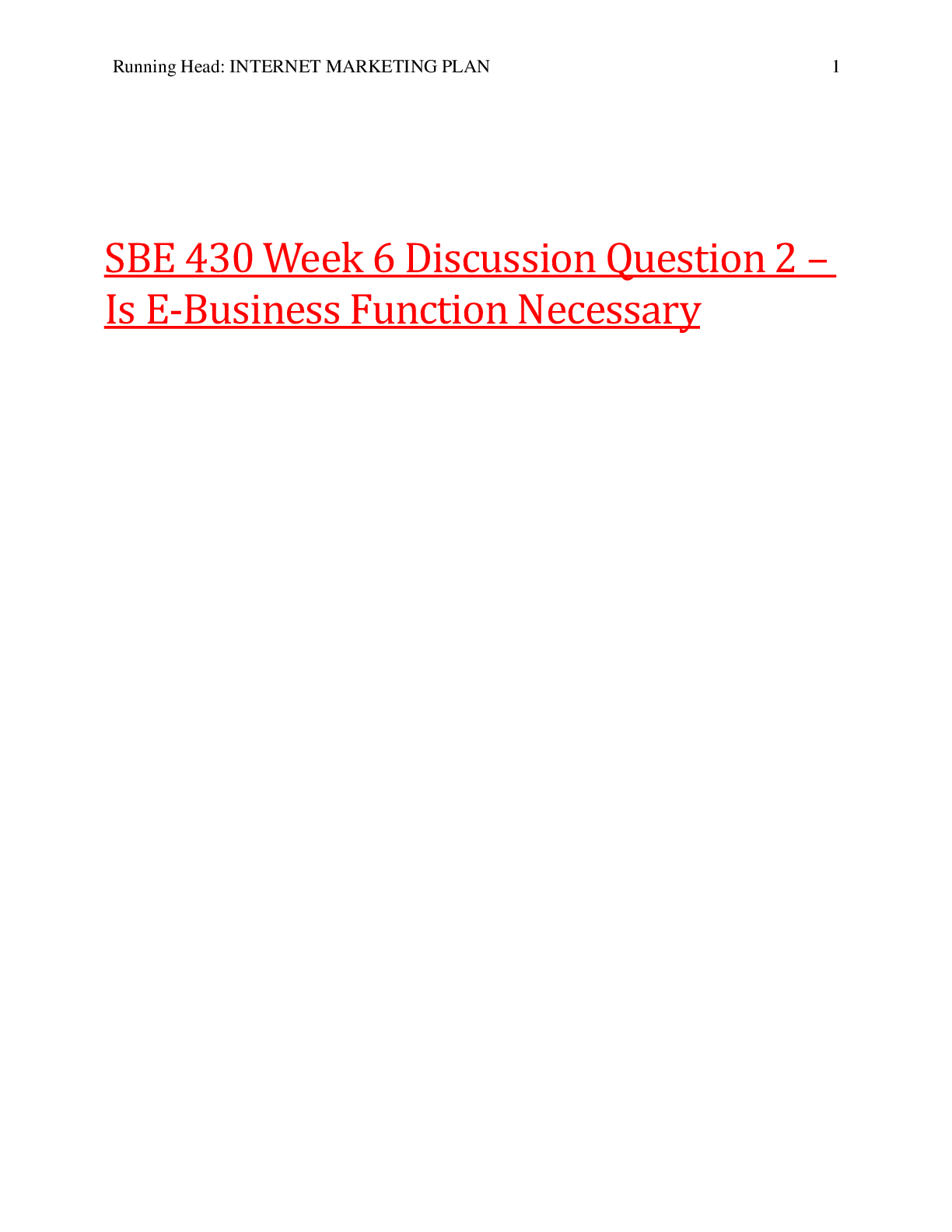
Reviews( 0 )
Document information
Connected school, study & course
About the document
Uploaded On
Jul 17, 2023
Number of pages
15
Written in
Additional information
This document has been written for:
Uploaded
Jul 17, 2023
Downloads
0
Views
25

